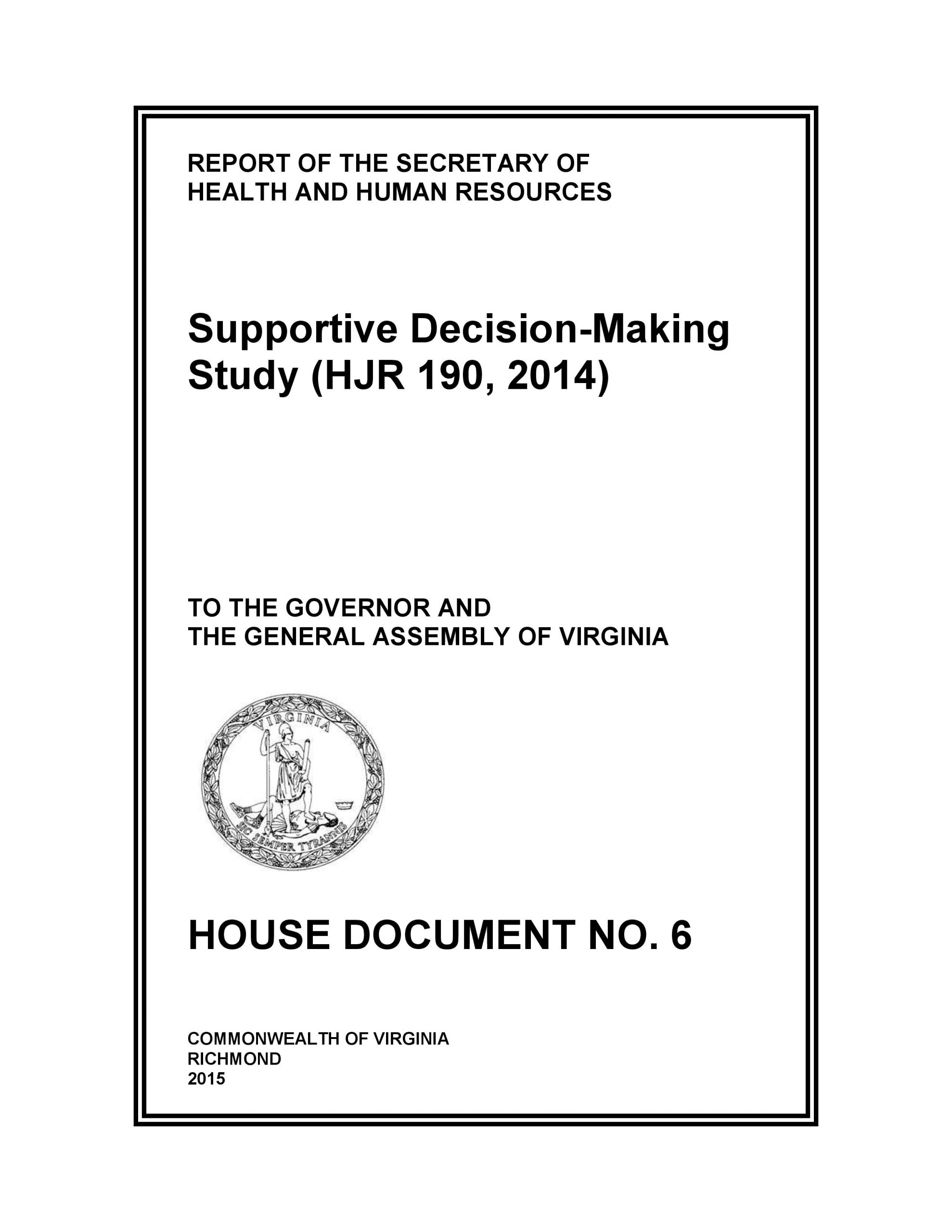Research
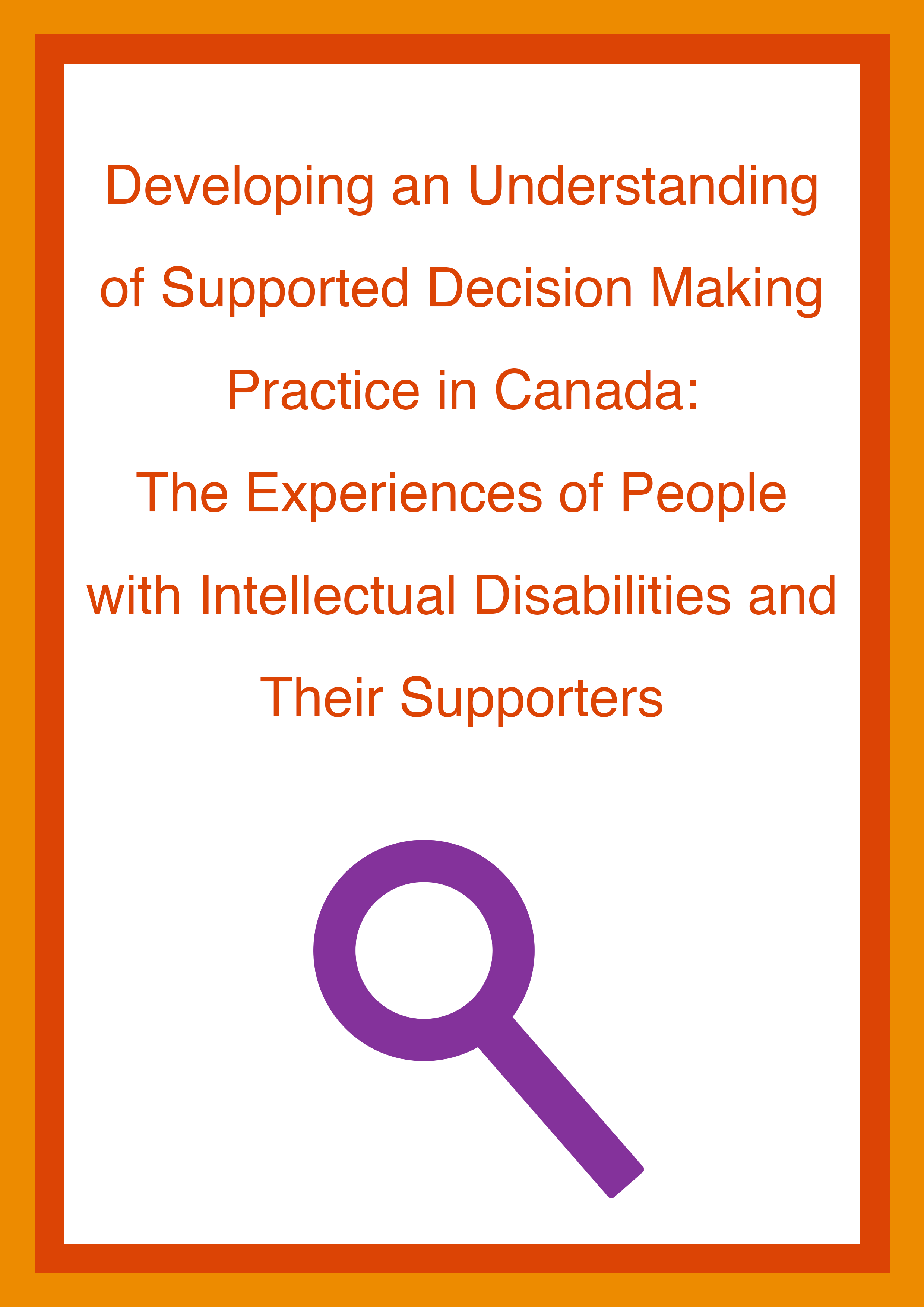
Developing an Understanding of Supported Decision-Making Practice in Canada: The Experiences of People with Intellectual Disabilities and Their Supporters
The aim of this research was to understand how people with intellectual disabilities were supported with decision making in the context of two legal mechanisms which create opportunities for supported decision-making in Canada, representation agreements and microboards. The research used a constructivist grounded theory methodology, interviewing and observing the decision making of seven people with mild to severe intellectual disabilities and 25 decision supporters. Thirty-four interviews and 104 hours of participant observation were conducted.
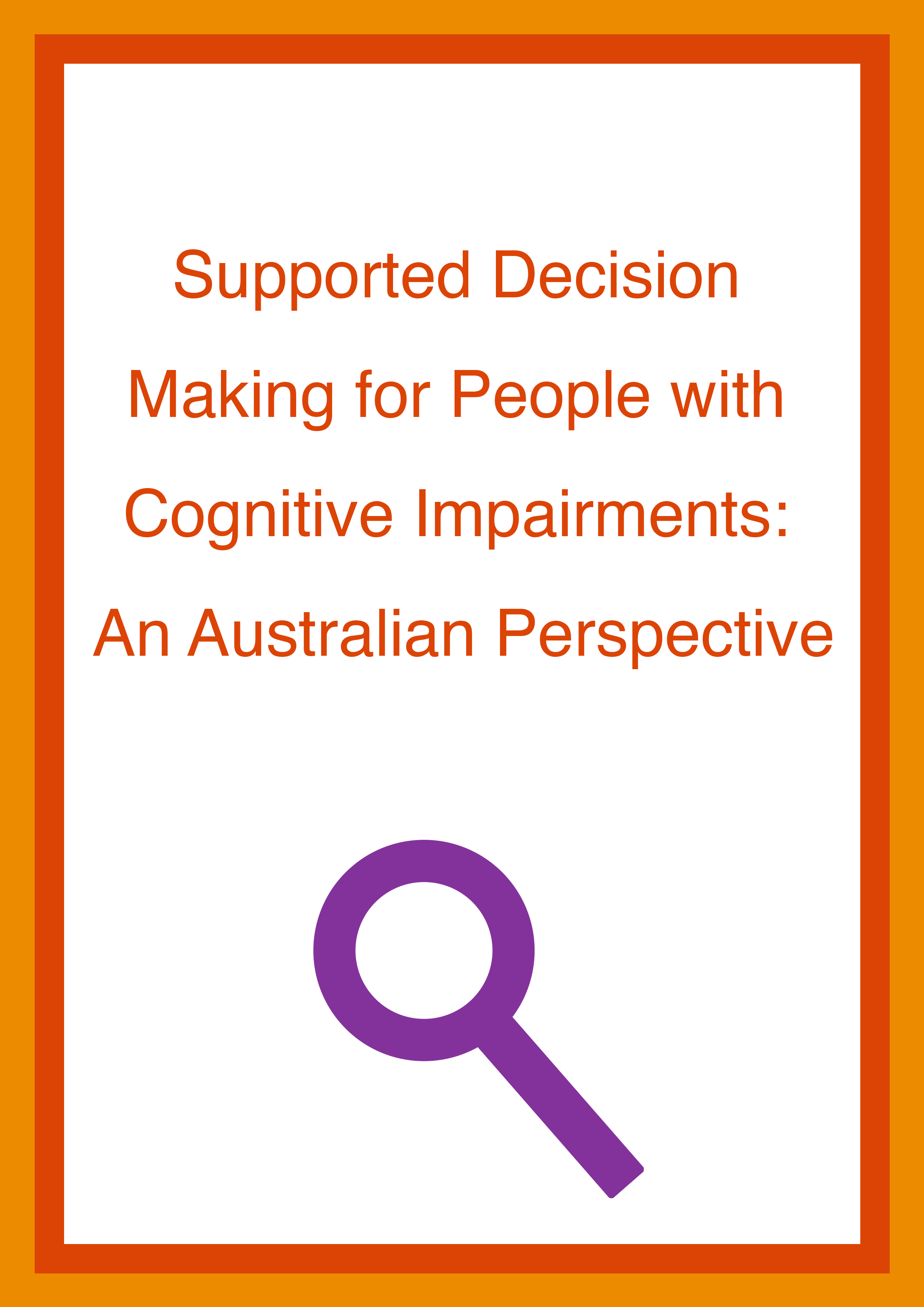
Supported Decision-Making for People with Cognitive Impairments: An Australian Perspective?
Honouring the requirement of the Convention on the Rights of Persons with Disabilities to introduce supported decision-making poses many challenges. Not least of those challenges is in writing laws and devising policies which facilitate access to formal and informal supports for large numbers of citizens requiring assistance with day-to-day issues such as dealing with welfare agencies, managing income security payments, or making health care decisions.
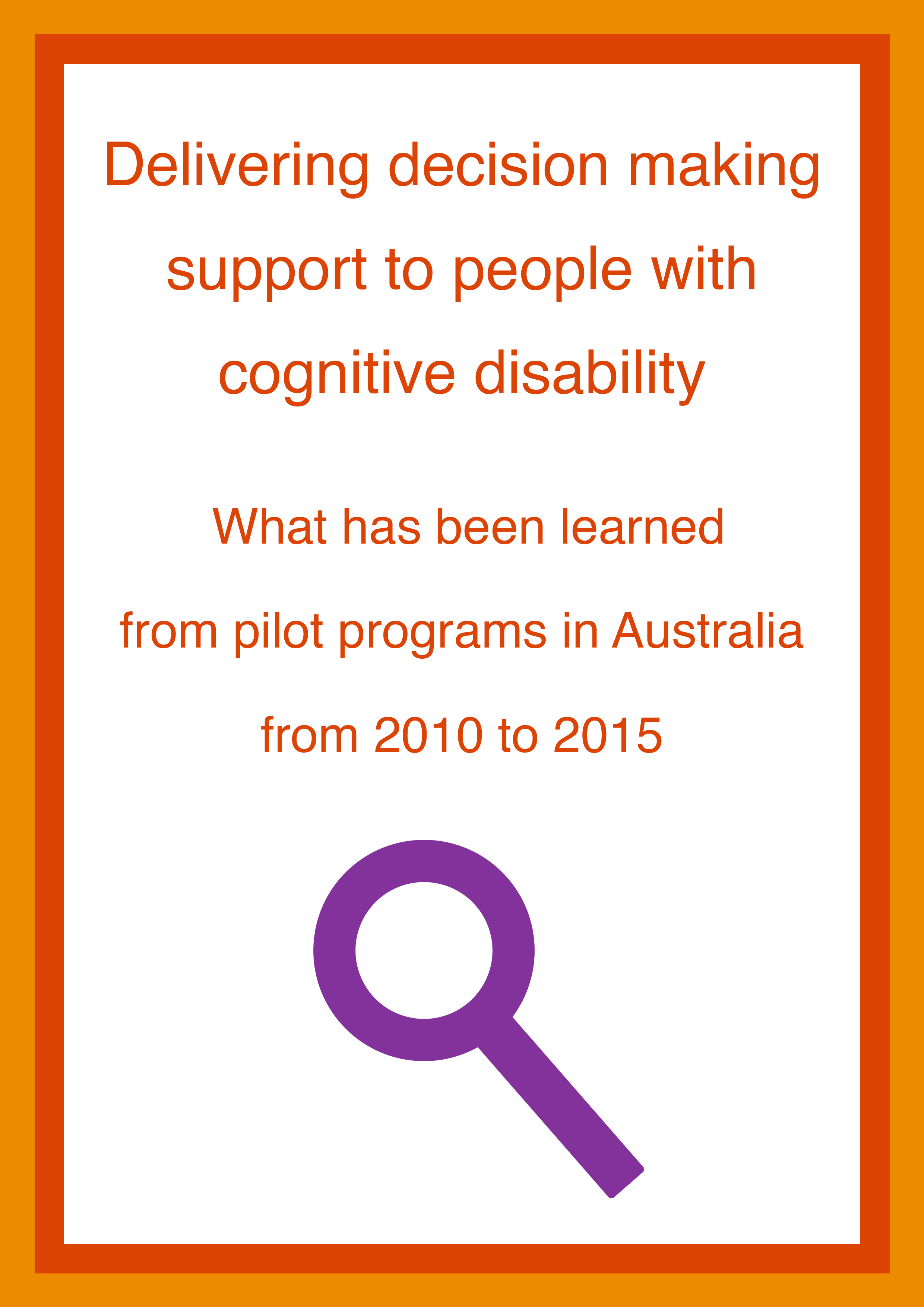
Delivering decision making support to people with cognitive disability — What has been learned from pilot programs in Australia from 2010 to 2015
The UNCRPD has generated debate about supported decision making as a way to better enable people with cognitive disability to participate in decision making. In Australia, between 2010–2015, a series of projects have piloted various models of delivering decision making support.
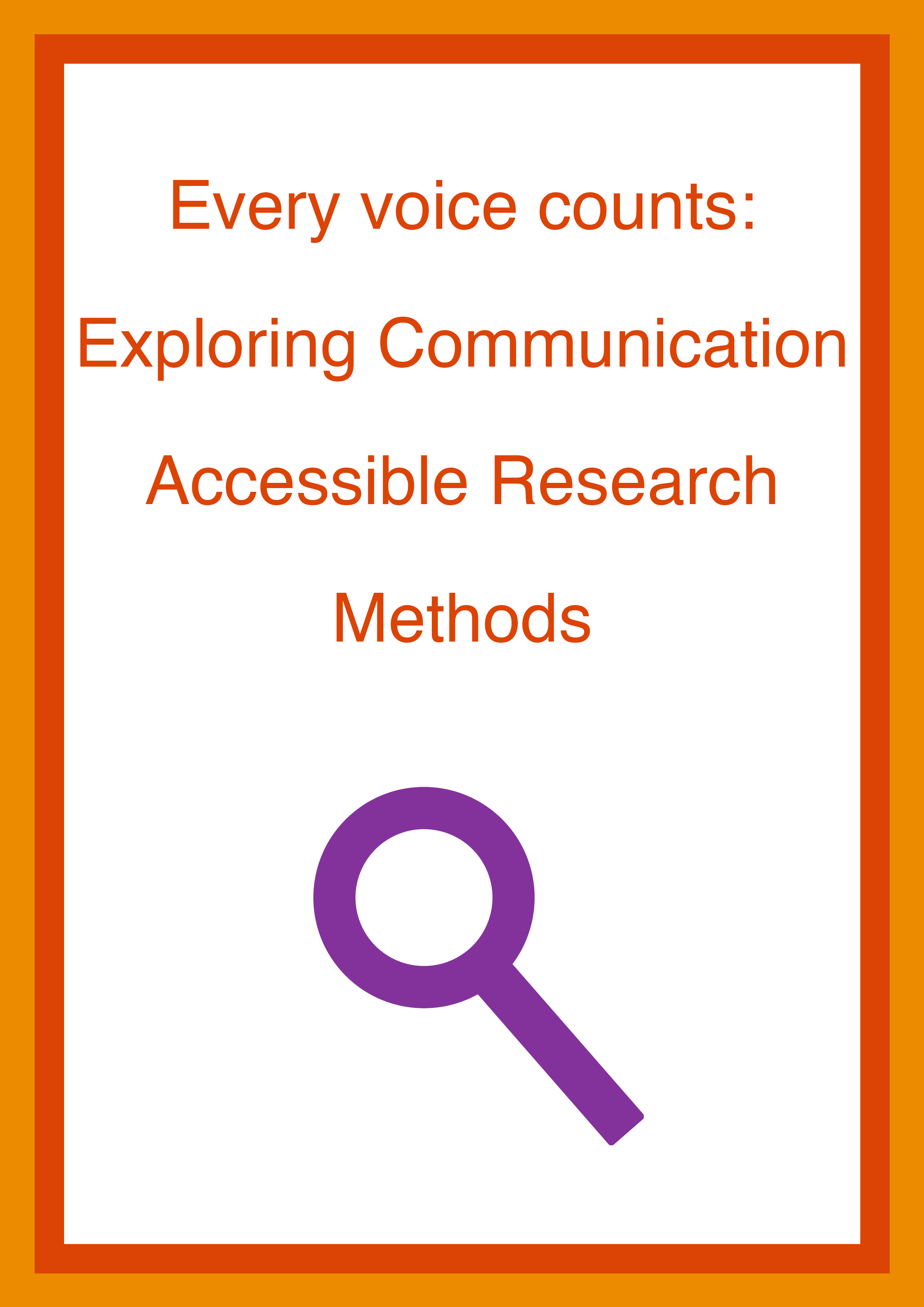
Every voice counts: Exploring Communication Accessible Research Methods
This article reports on the development, implementation and evaluation findings of four data collection techniques. These methods, ‘theory generated photo elicitation’ ‘adapted image selection’ ‘participant sensory selection’ and ‘sensory ethnography’ were tested and implemented in a study of people with CCAN. The study contributes to the knowledge of communication accessible research participation with applicable to disability-based qualitative research across multiple fields.
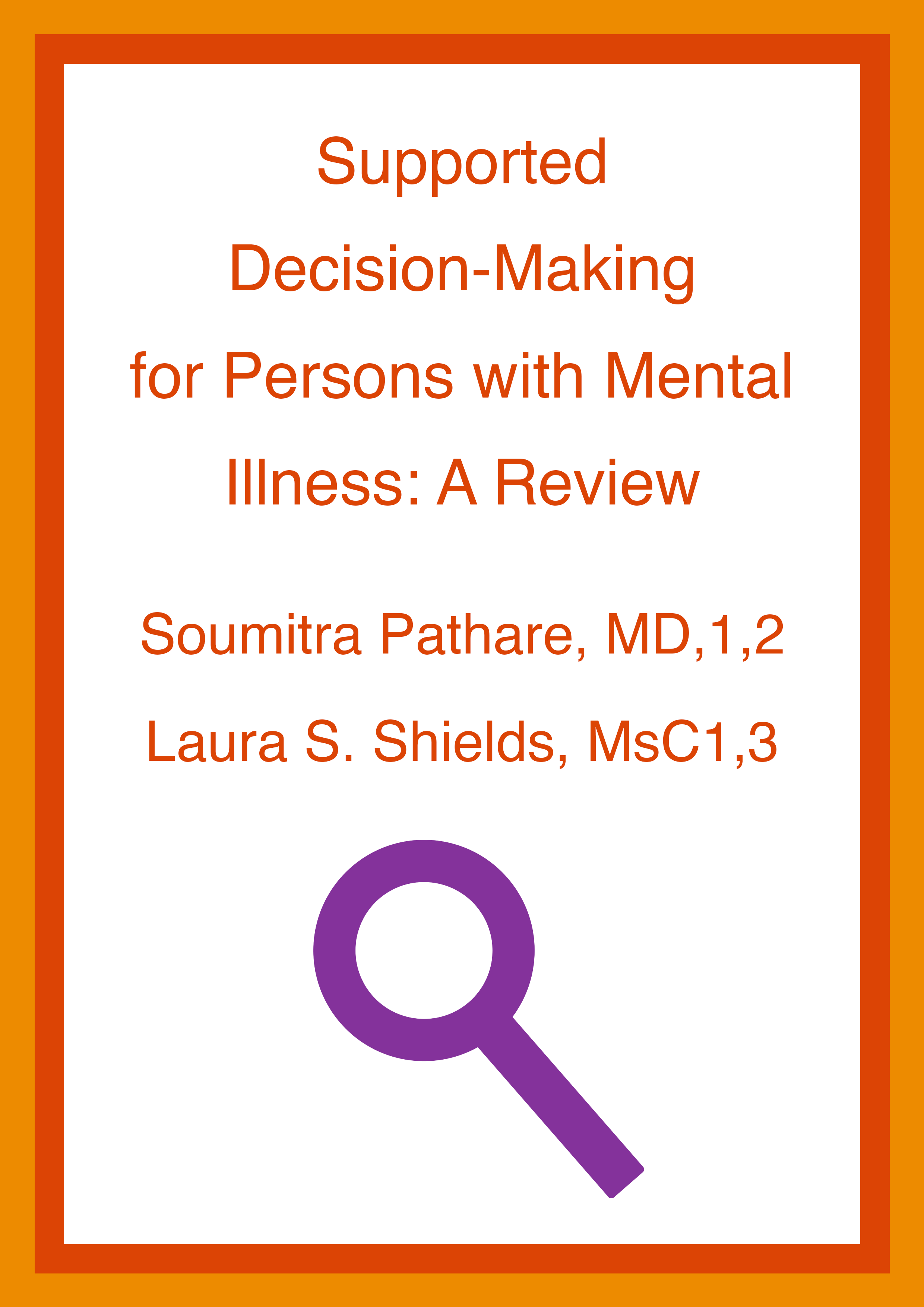
Supported Decision-Making for Persons with Mental Illness: A Review
This review highlights the need for additional research in this area to better guide models, which can be utilised in domestic legislation, particularly in low and middle income countries, to better implement the ideals of Article 12 of the CRPD. Persons with mental illness are often not afforded the same opportunity to make decisions on a par with others in society. Article 12 of the International Convention on the Rights of Persons with Disabilities (CRPD) states that persons with disabilities should have equal recognition before the law and the right to exercise their legal capacity. Exercising legal capacity can mean making decisions about employment, medical or psychosocial treatment, property, finances, family, and participation in community activities.
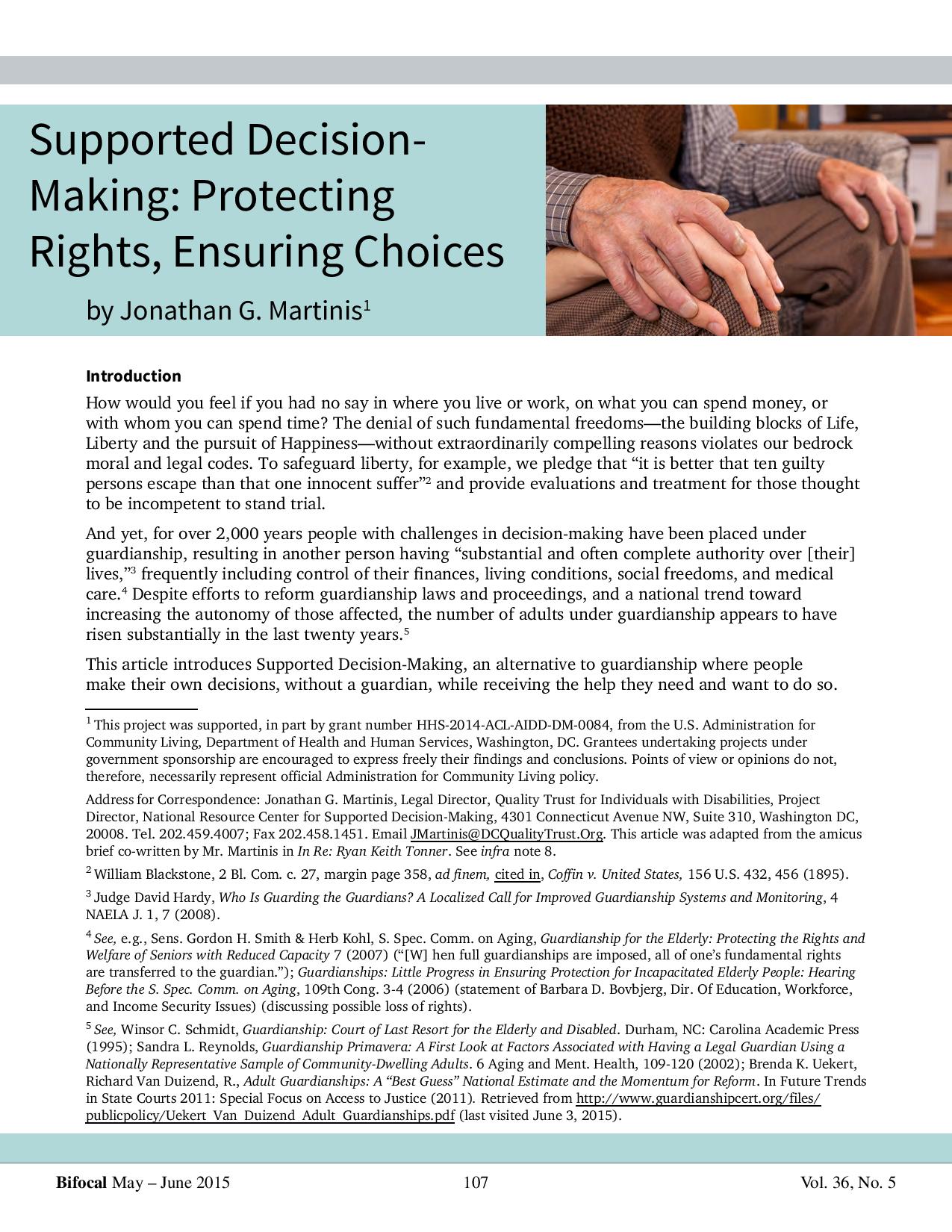
Supported Decision Making: Protecting Rights, Ensuring Choices
This article introduces Supported Decision-Making, an alternative to guardianship where people make their own decisions, without a guardian, while receiving the help they need and want to do so.
Supported Decision-Making protects and enhances the “principal prerogative all people have to make their own decisions and direct their own lives to the maximum of their abilities” and can improve life outcomes like health, independence, safety, and employment.
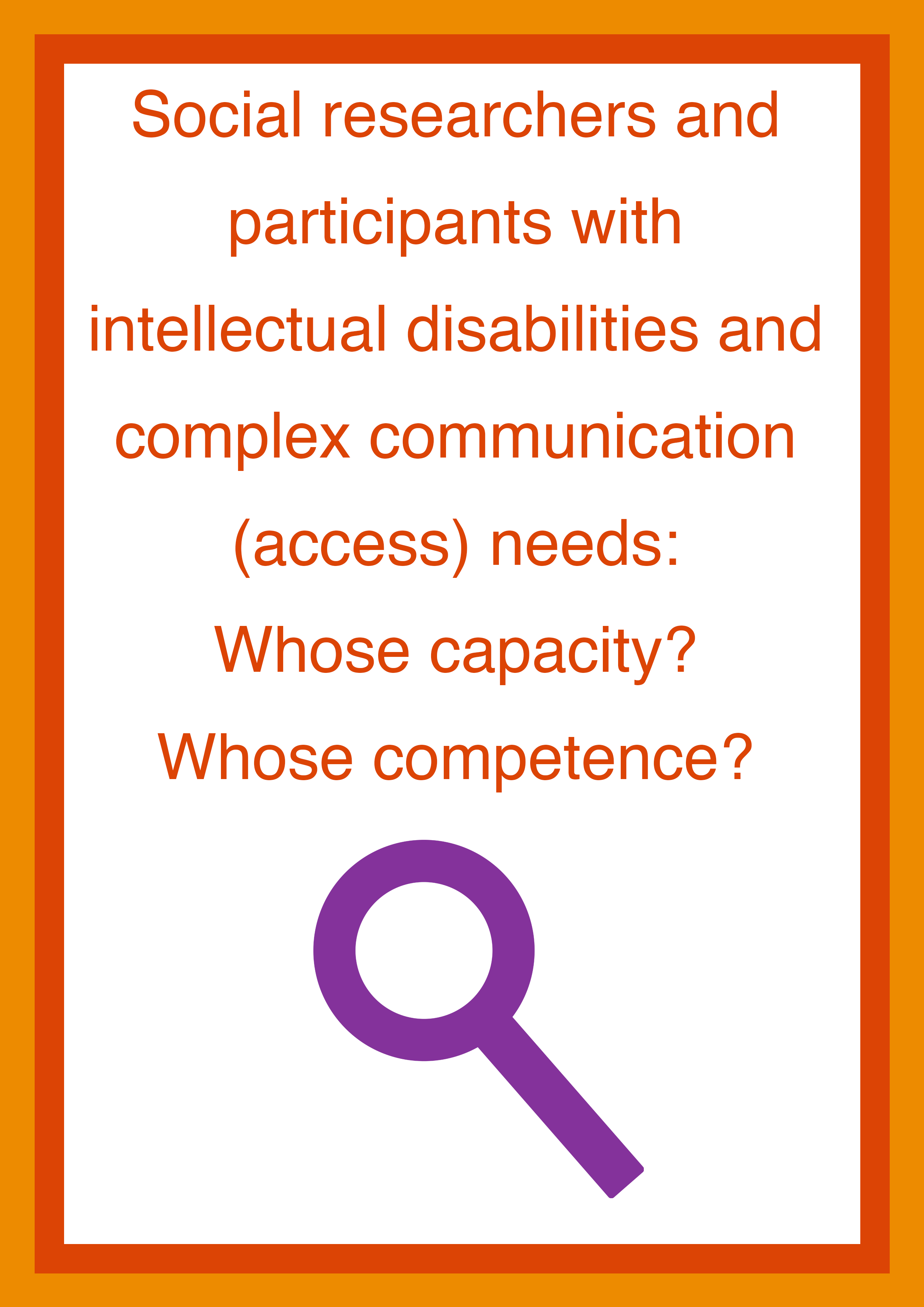
Social researchers and participants with intellectual disabilities and complex communication access needs: Whose capacity? Whose competence?
Despite the evolution of inclusive research and augmentative and alternative communication, there is an ongoing absence of people with intellectual disabilities and complex communication (access) needs from sociological cohorts. In an in-depth study of 10 individuals with complex communication access needs, the involvement of three participants with intellectual disabilities was highlighted. The purpose of this article is to describe how the investigation was conceptualised, designed, and adapted to maximise the participation of adults with intellectual disabilities and complex communication access needs.
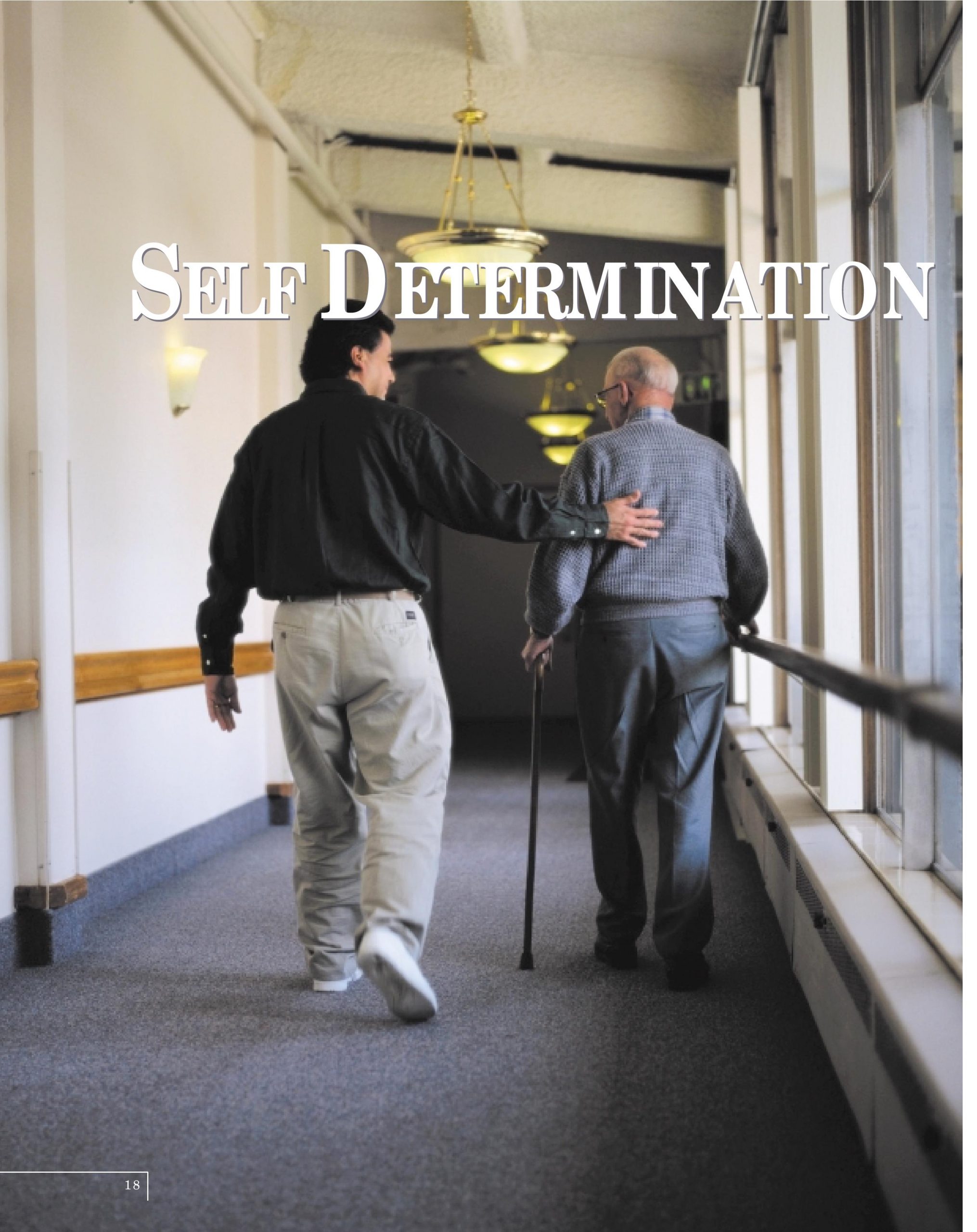
Self Determination And Person Centred Planning
Older people and people with disabilities can, in Michigan, be in charge of making the decisions affecting their lives. However, if they are dependent on a public system for the services and supports they need, in the past they were not given the power to make these choices. Self-determination with person-centered planning has been mandated in Michigan by MCL 330.1700(g). This may cause the most significant change in the delivery of services to individuals with disabilities in many years. This is a process designed to shift power in negotiating the mental health system from the professional to the individual receiving services.
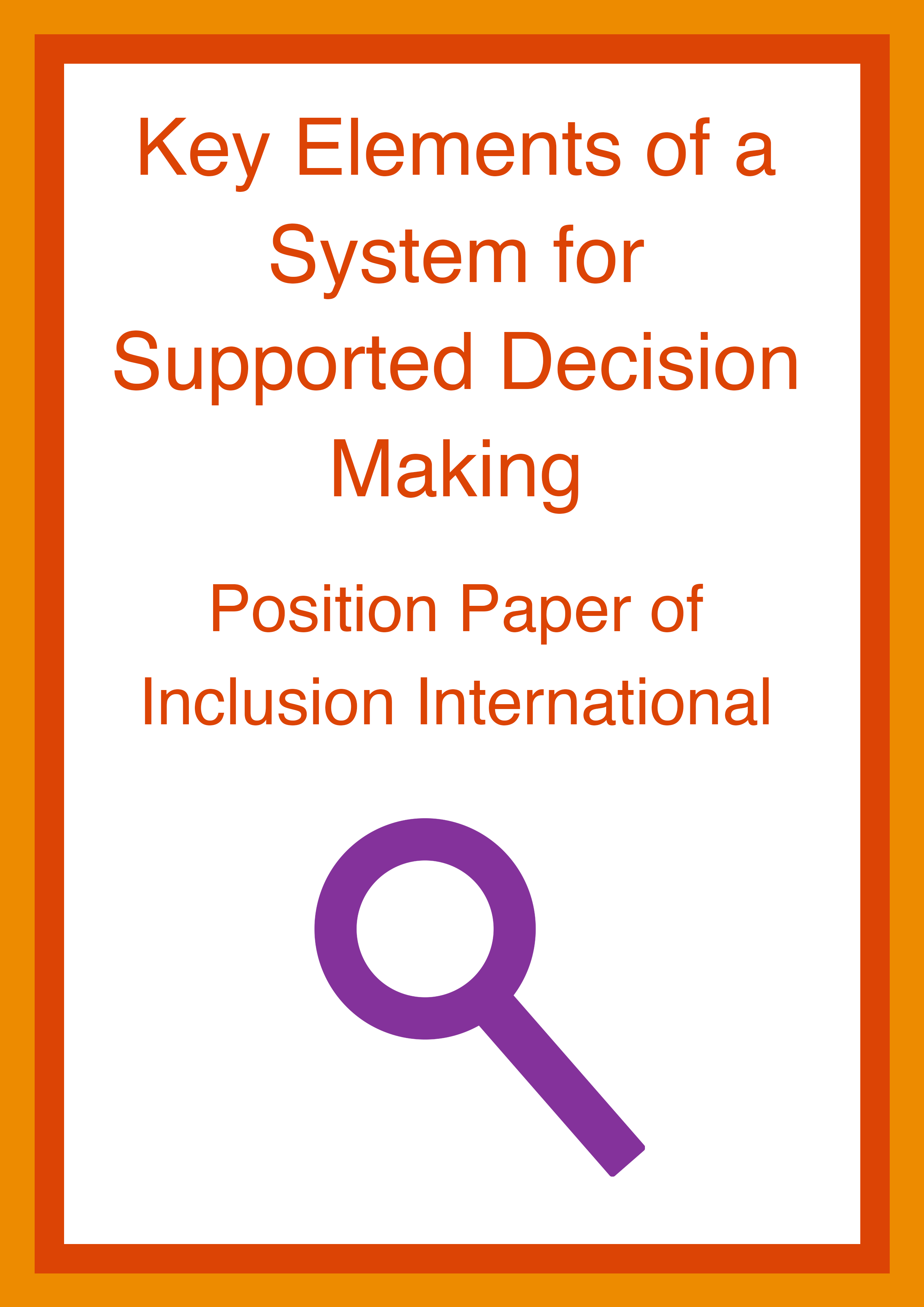
Key Elements of a System for Supported Decision Making: Inclusion International Position Paper
This Position Paper explores which key elements are necessary to implement the UN Convention on Rights of a Person with Disability in the legal systems of all countries that have ratified the Convention. Starting from the discussion of some basic notions regarding legal capacity, the Position Paper identifies eight elements that should be considered in the implementation of this article to make the UN Convention a tool that promotes the rights of persons with intellectual disabilities.
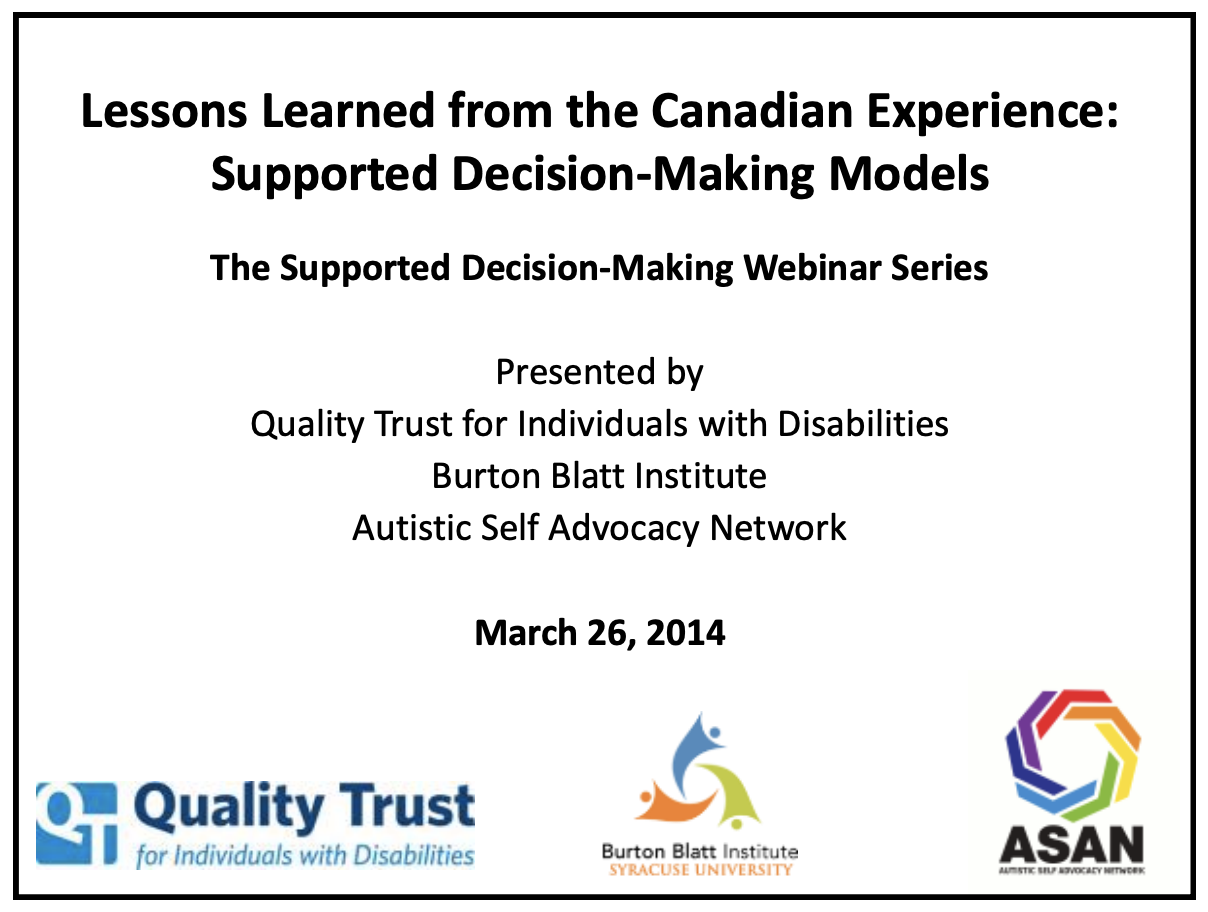
Lessons Learned from the Canadian Experience: Supported Decision-Making Models
Presentation slides from The Supported Decision-Making Webinar Series, outlining Canada’s experience of building a Supported Decision Making Model.
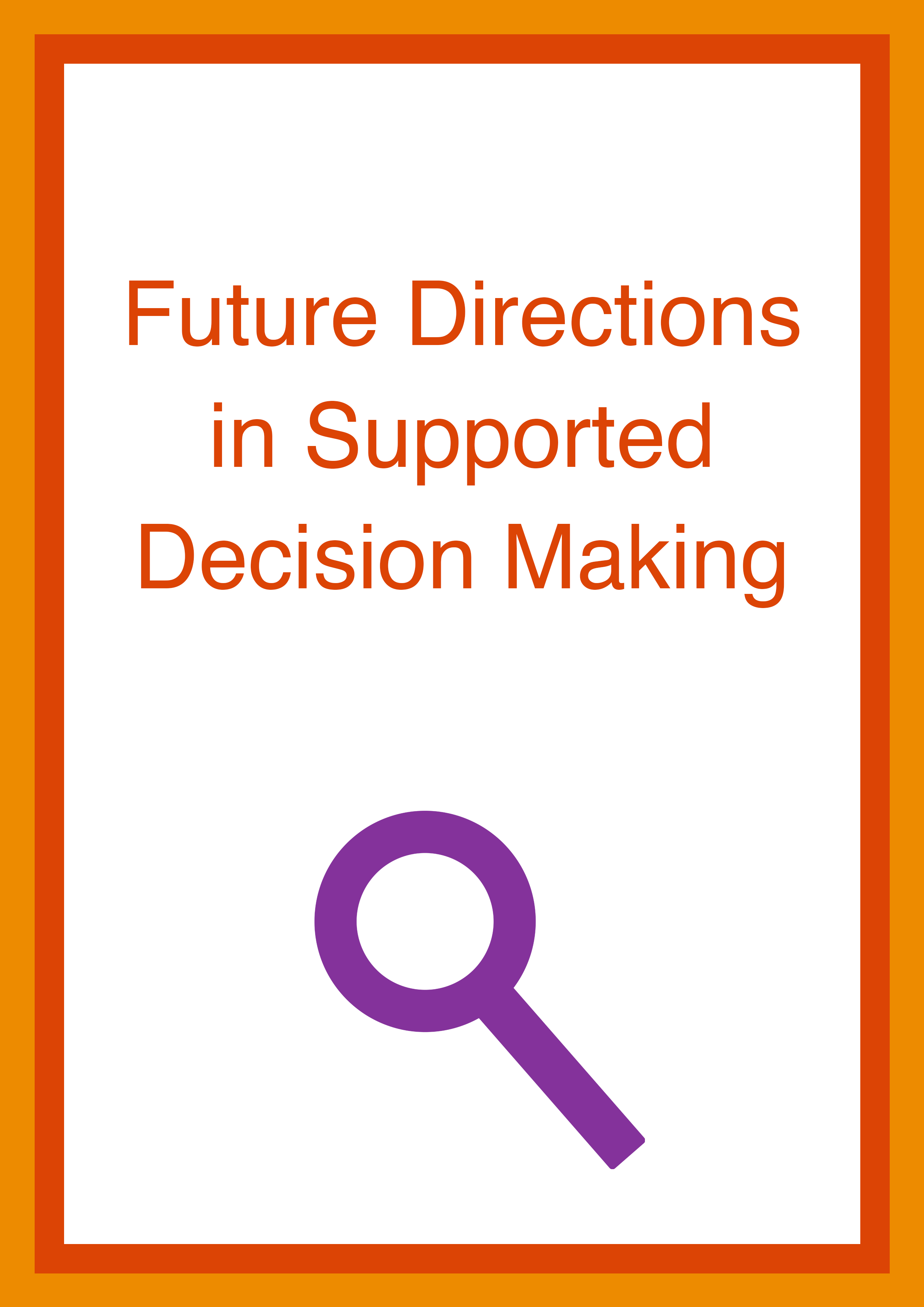
Future Directions in Supported Decision-Making
This article explores the theoretical foundations of supported decision-making and the evolution of supported decision-making research. It explains the research that is emerging in leading jurisdictions, the United States and Australia, and its potential to transform disability services and laws related to decision-making. Finally, it identifies areas of concern in the direction of such research and provides recommendations for ensuring that supported decision-making remains protective of the rights, will and preferences of people with cognitive disability.
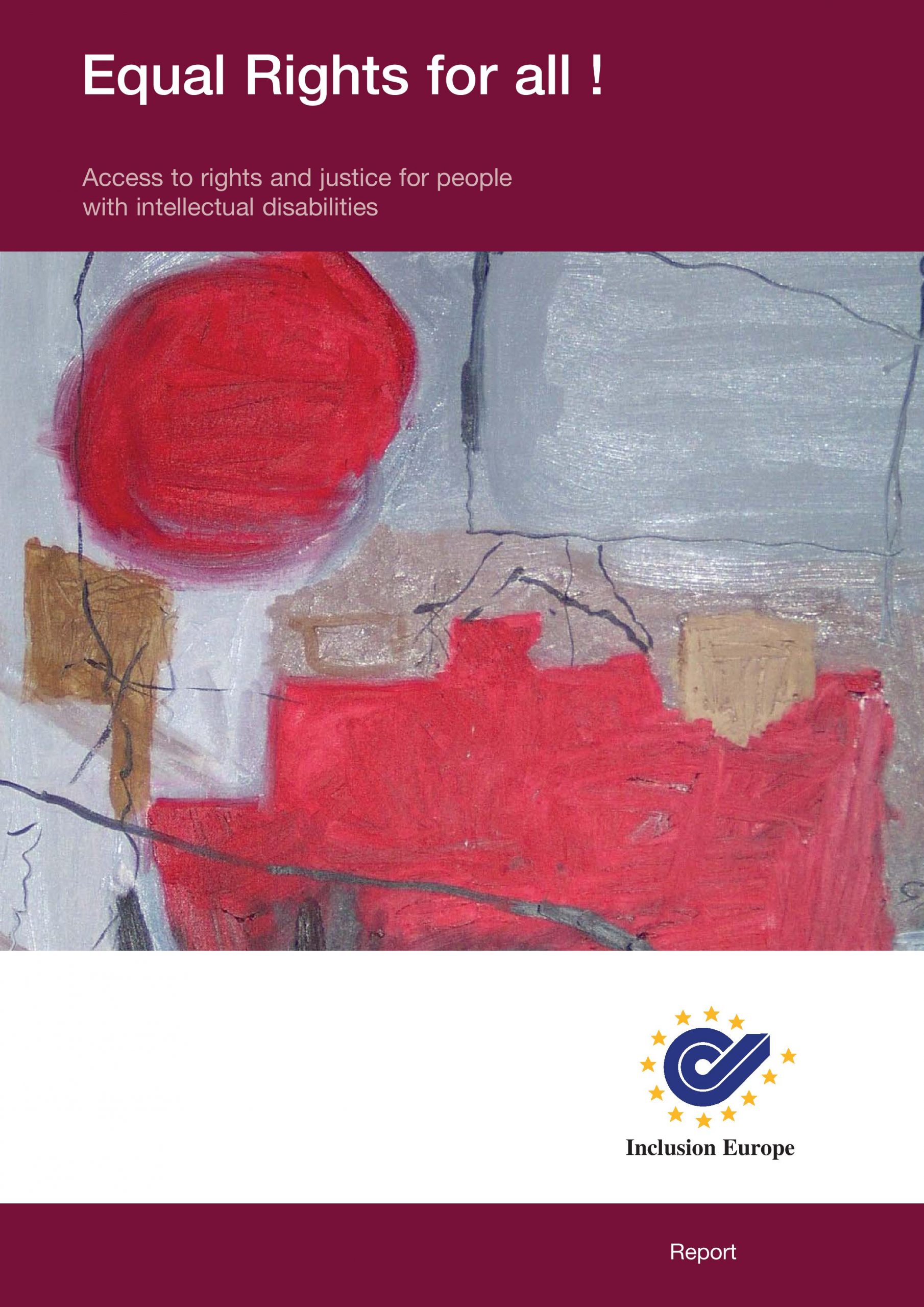
Equal Rights For All! Access To Rights And Justice For People With Intellectual Disabilities
In this document, the partners of the project “Justice, Rights and Inclusion for People with Intellectual Disabilities” have outlined some principles that cover the most important aspects of legal capacity, legal assistance, legal protection and representation of adults with intellectual disabilities.
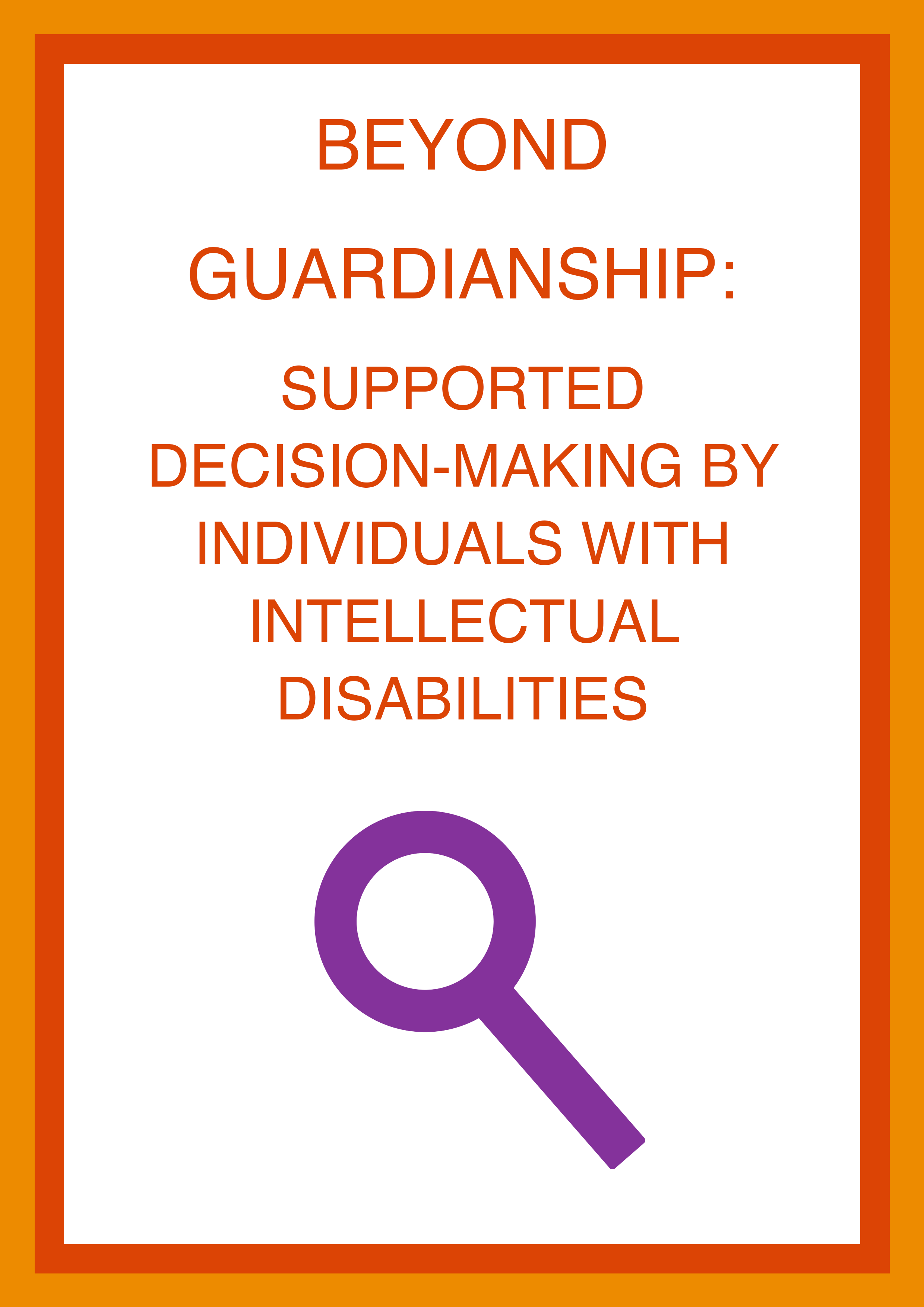
Beyond Guardianship: Supported Decision Making By Individuals With Intellectual Disabilities
This briefing paper prepares for a Roundtable discussion to explore and generate ideas beginning from a presumption of competence, promoting the rights, self-determination and independence of people with intellectual disabilities, emphasizing dignity and freedom of choice, supporting individuals with intellectual disabilities in the decision-making process and implementing the least restrictive options. For governments to fulfill their obligations under Article 12, this requires what many have referred to as a “paradigm shift” in the usual approaches to protecting and promoting the right to legal capacity. Adults can no longer be required to demonstrate that they meet certain tests of mental capacity in order to have their rights to legal capacity equally respected and protected. The United Nations Convention on the Rights of Persons with Disabilities (UNCRPD) recognizes this right and the supports needed to exercise it as an obligation, under international law, of governments to create and honour what is called “supported decision-making.”
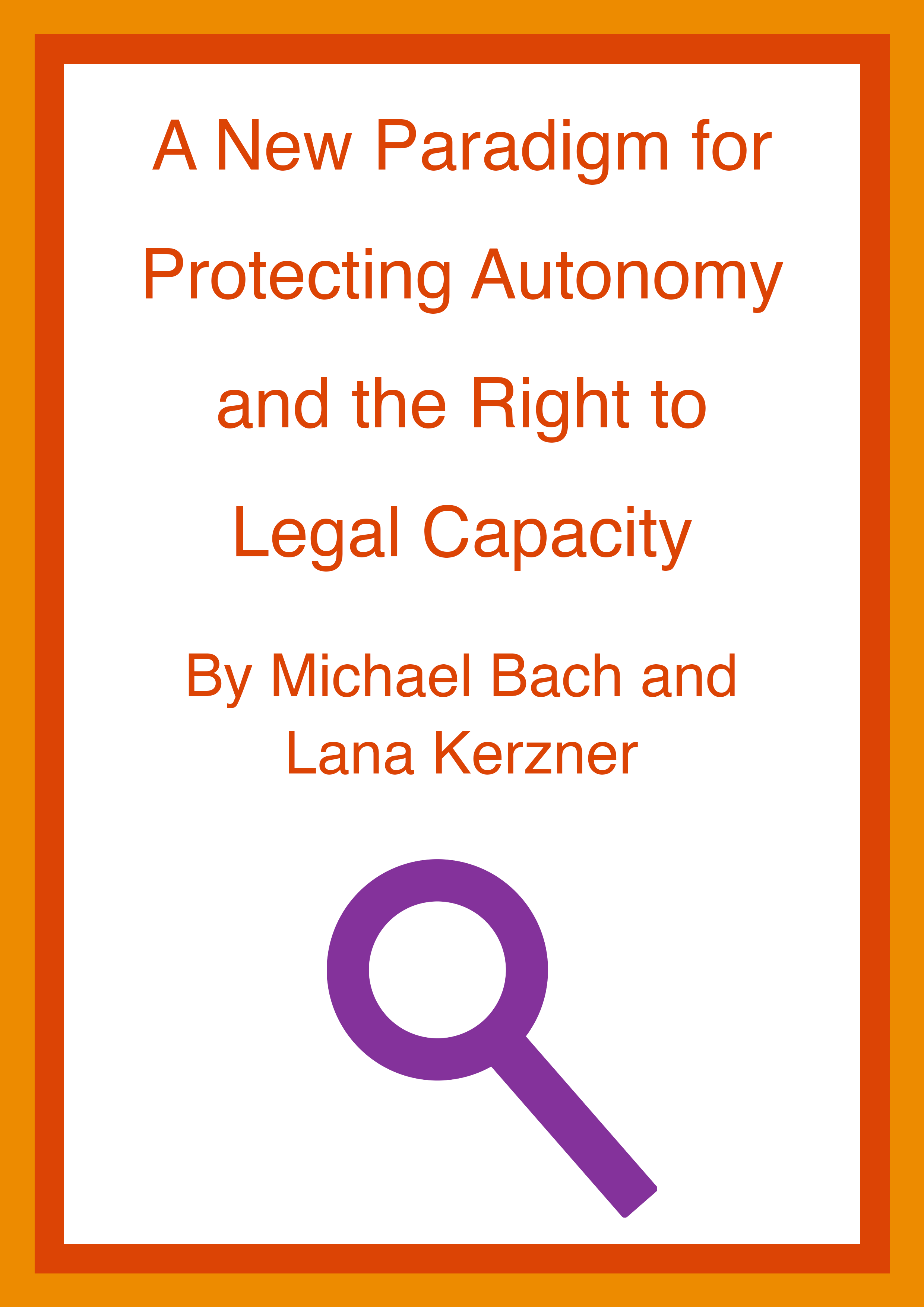
A New Paradigm for Protecting Autonomy and the Right to Legal Capacity
A summary of a paper that attempts to answer a question framed by the Law Commission of Ontario: “What principles and considerations should be applied when considering placing limitations on the ability of persons with disabilities to make their own choices?” In particular, the paper identifies persons with severe intellectual, cognitive or psychosocial disabilities as most at risk of being considered “not capable” of decision making by people caring for them.
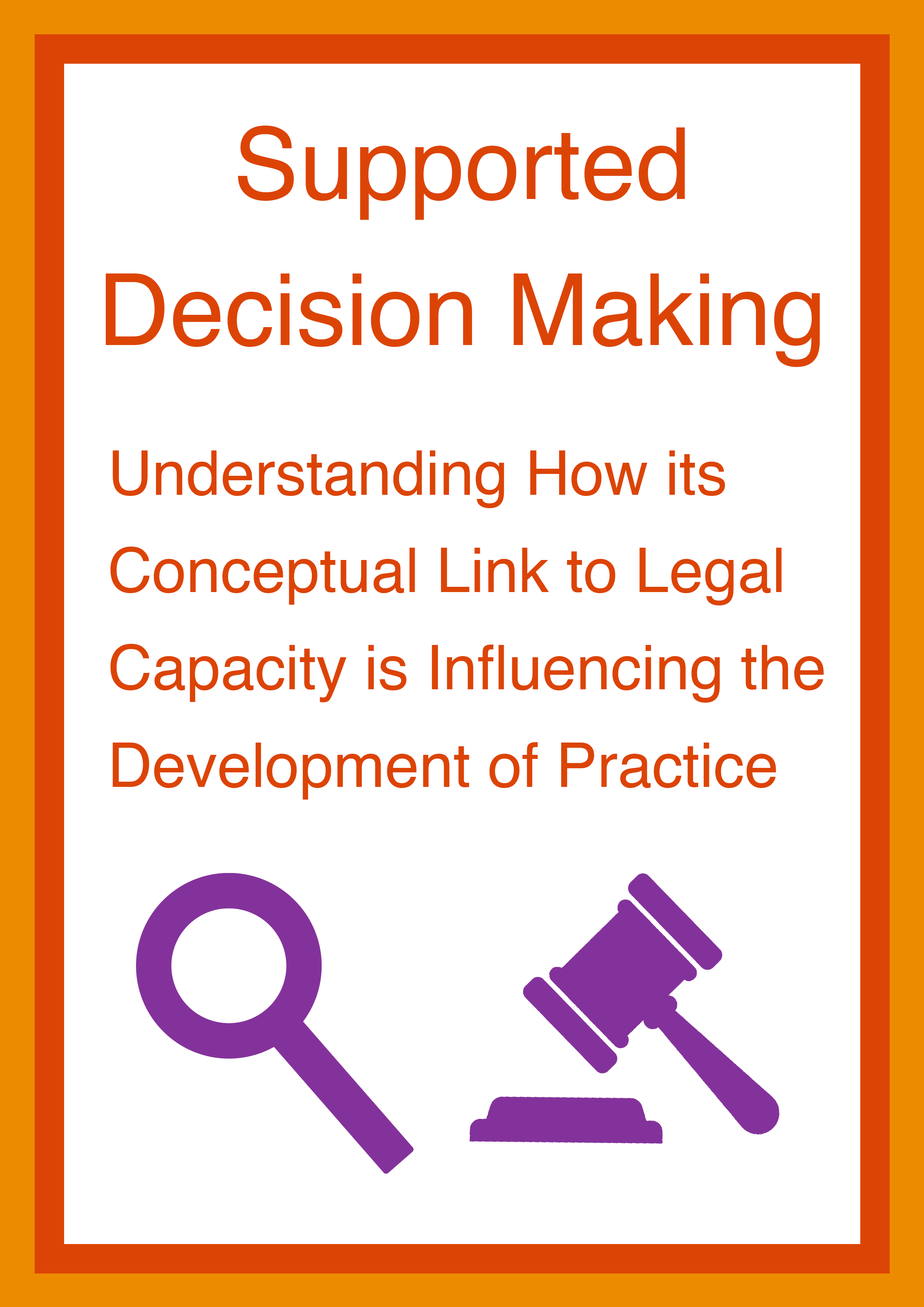
Supported Decision Making: Understanding How its Conceptual Link to Legal Capacity is Influencing the Development of Practice
This article aims to help readers to understand the conceptual link between supported decision making and legal capacity and how this is influencing the development of practice. It examines how the concept has been defined as: a process of supporting a person with decision making; a system that affords legal status; and a means of bringing a person’s will and preference to the centre of any substituted decision-making process. The conceptual link between supported decision making and legal capacity is explored by outlining three conceptualisations that are influencing the development of practice.
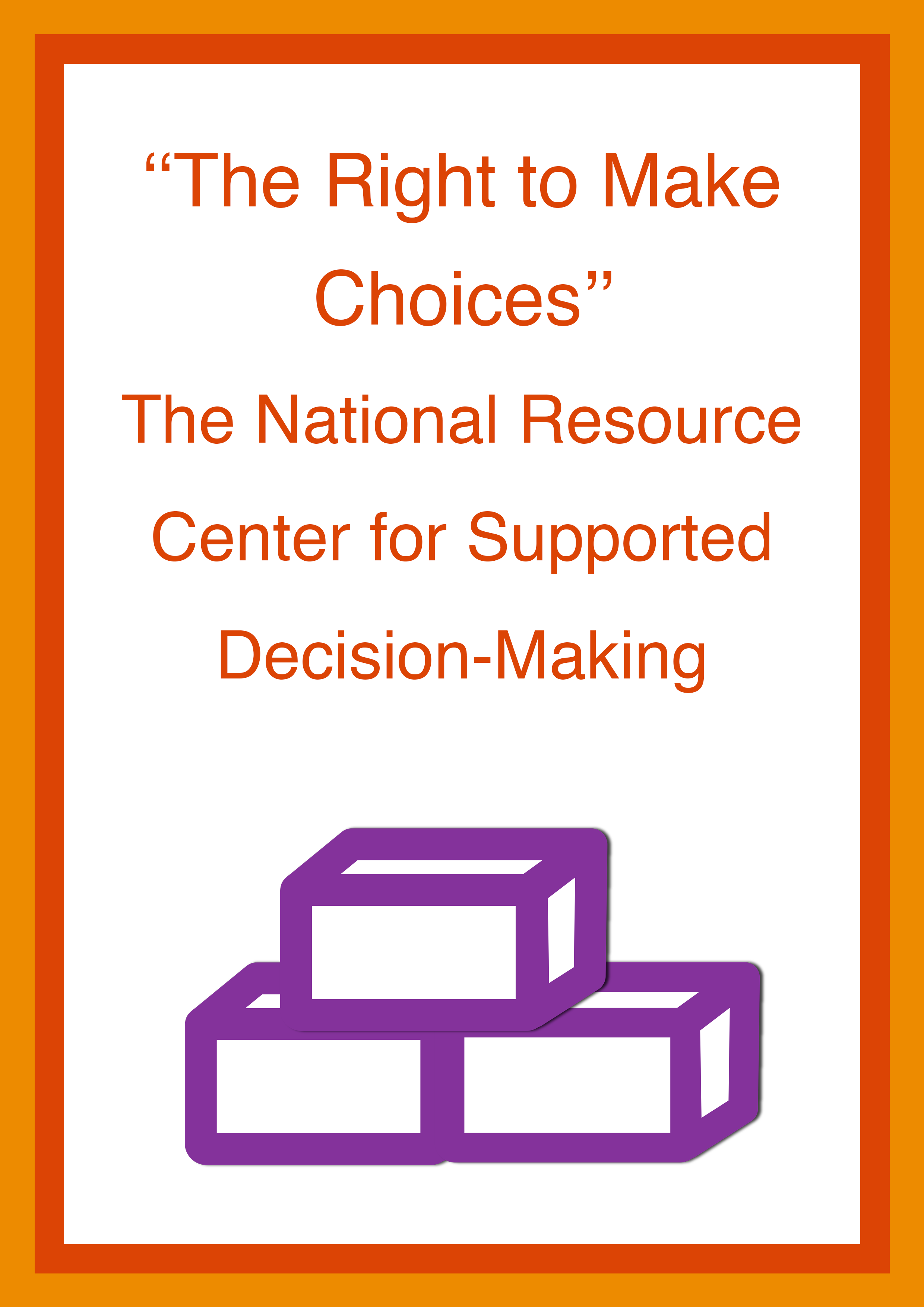
‘‘The Right to Make Choices’’: The National Resource Center for Supported Decision-Making
Research shows that self-determination and the right to make life choices are key elements for a meaningful and independent life. Yet, older adults and people with disabilities are often placed in overly broad and restrictive guardianships, denying them their right to make daily life choices about where they live and who they interact with, their finances, and their health care. Supported decision-making (SDM)—where people use trusted friends, family members, and professionals to help them understand the situations and choices they face, so they may make their own decisions—is a means for increasing self-determination by encouraging and empowering people to make decisions about their lives to the maximum extent possible. This article examines the implications of overly broad guardianship and the potential for supported decision-making to address such circumstances. It introduces the National Resource Center for Supported Decision-Making as one means to advance the use of supported decision-making and increase self-determination.
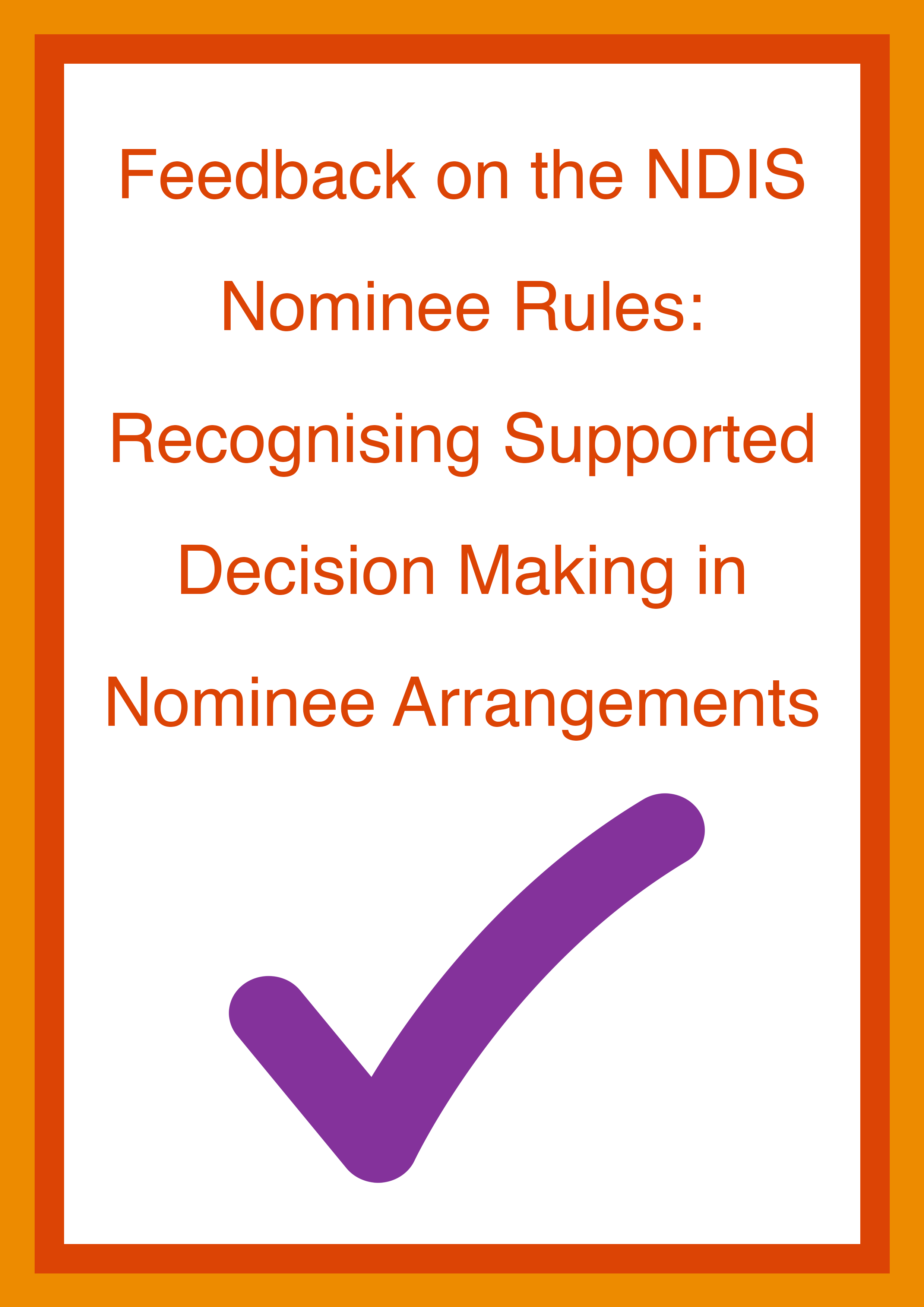
Feedback on the NDIS Nominee Rules: Recognising supported decision making in nominee arrangements
The principles of the NDIS Act, and the associated principles in the Nominee Rules (see the draft attached to this document), are sound principles that uphold the rights of participants. The draft legislation requires that participants are to be involved in decisions that affect them, including making decisions for themselves, to the extent possible. The draft rules require a presumption of decision making capacity, and that nominees will only be appointed when it is not possible for a person to be assisted to make decisions for themselves. This analysis suggests further division of the roles of nominees that occurs up front, as a way of maximising the opportunity for people with a disability to make decisions and gain personal authority in their lives through participation in the NDIS.
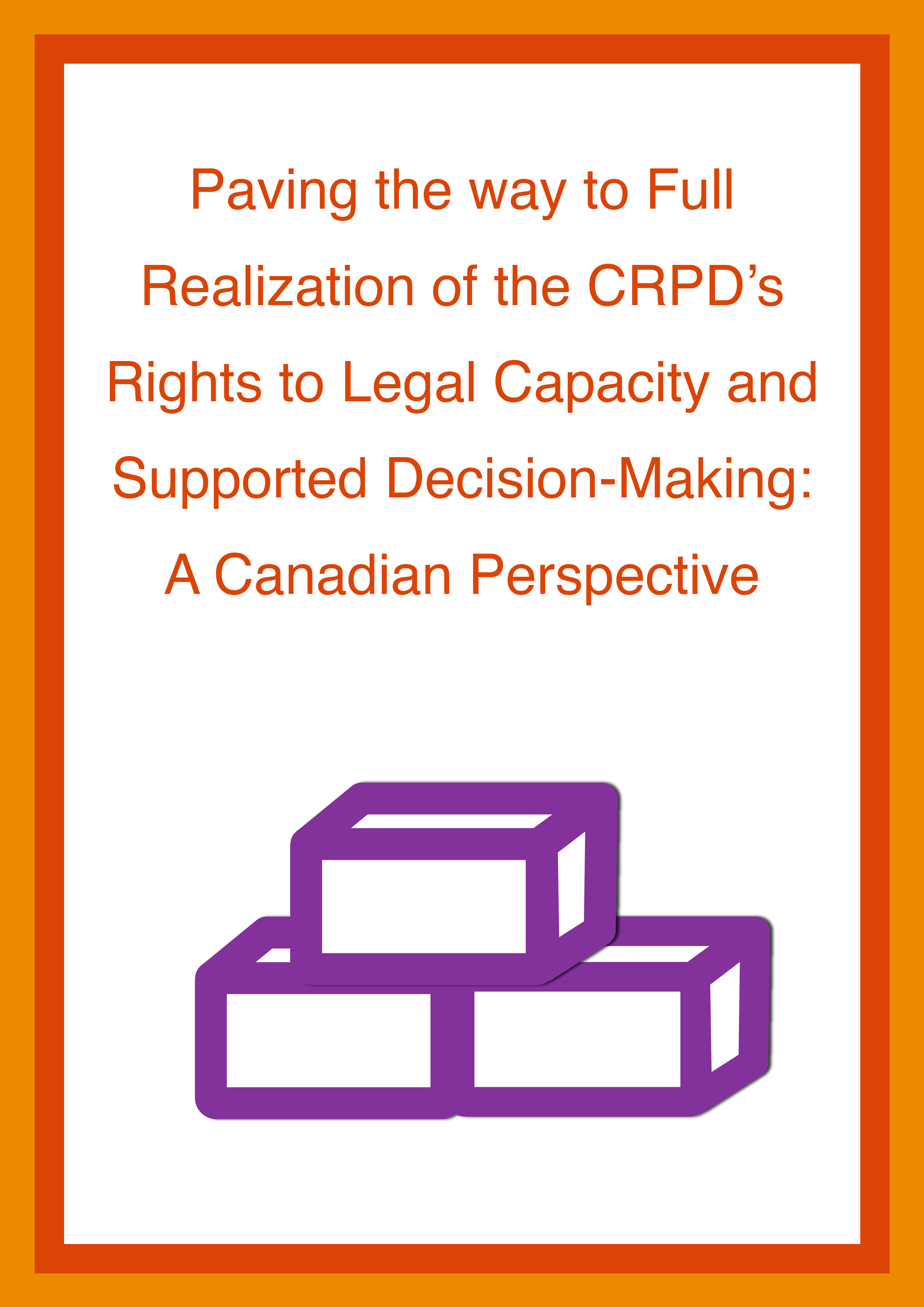
Paving the way to Full Realization of the CRPD’s Rights to Legal Capacity and Supported Decision-Making: A Canadian Perspective
This paper was written for a legal capacity symposium, “In From the Margins: New Foundations for Personhood and Legal Capacity in the 21st century,” being held at the University of British Columbia in April, 2011. It therefore focuses specifically on the article of the CRPD that addresses legal capacity, Article 12 is the section of the CRPD that specifically addresses the topics of legal capacity and decision-making. Before embarking on an analysis of Canada’s laws in the context of the extent to which they comply with Article 12, it is necessary to first explore its broad implications for decision-making regimes. What are the implications of the predominance of substitute decision-making regimes?
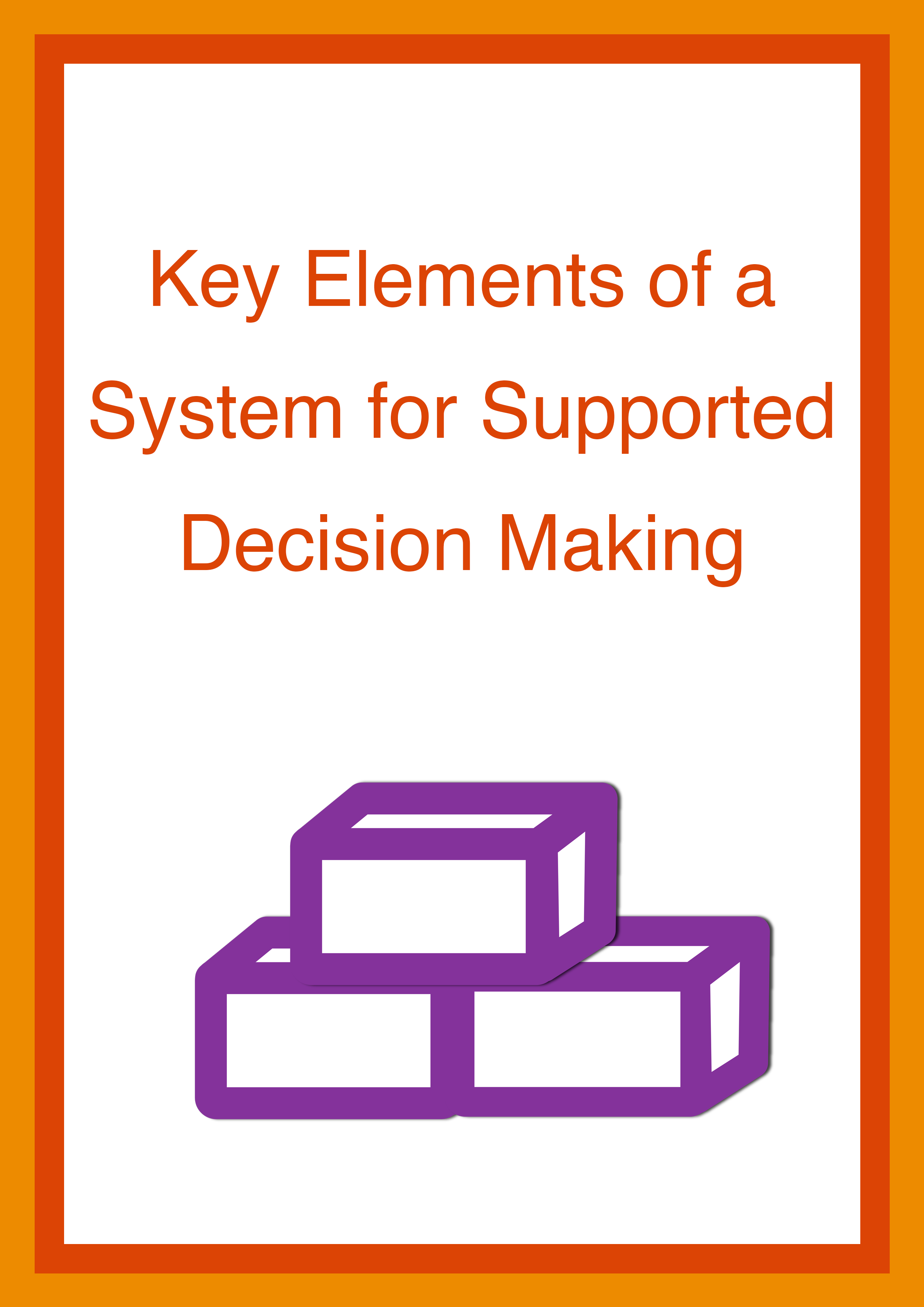
Key Elements of a System for Supported Decision-Making
The UN Convention on the Rights of Persons with Disabilities demands in its Article 12 equal recognition before the law for all persons with disabilities. This Position Paper explores which key elements are necessary to implement this principle in the legal systems of all European countries. Starting from the discussion of some basic notions regarding legal capacity, the Position Paper identifies eight elements that should be considered in the implementation of this article to make the UN Convention a tool that promotes the rights of persons with intellectual disabilities.

Providing support for decision making: Perspectives of family members and workers in disability support services
This study aimed to understand the experiences of family members and disability support workers in providing support to adults with intellectual disability in Victoria, Australia. Twenty-three people drawn from these two groups participated in individual or focus group interviews. This study identified some of the challenges and practical strategies for providing decision support that can be used to inform practice and capacity building resources for supporters. Three major themes emerged from inductive thematic analysis: their ideas about decision support, approaches to support, and challenges they faced.
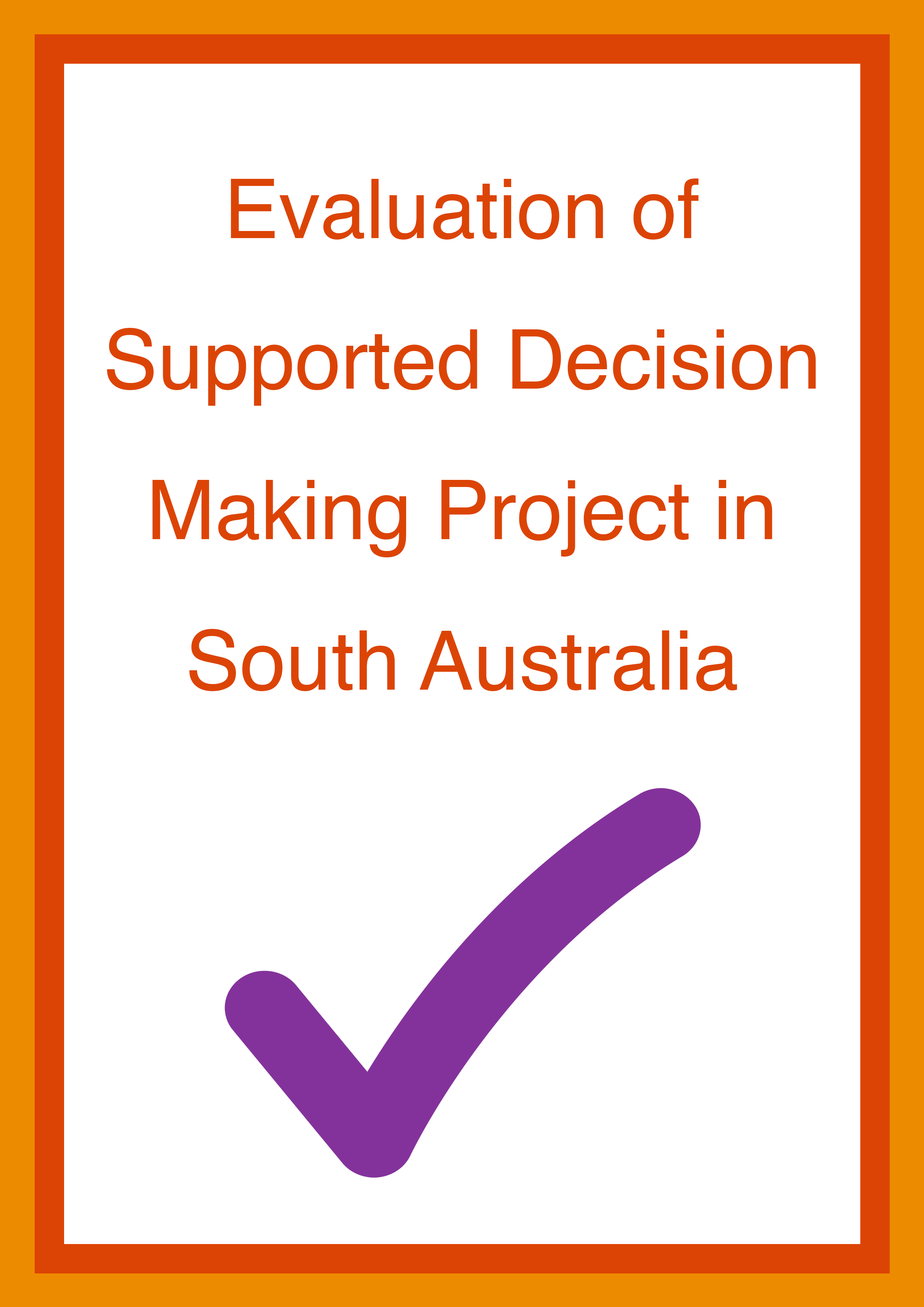
Evaluation of Supported Decision Making Project in SA
This evaluation report is in several parts. It provides background to the project. It includes a section on findings from the evaluation, with particular attention given to the experience of the project participants and their supporters. The report includes four stories from people with disabilities who were participants in the project. It also includes a section on issues to consider in the further development of Supported Decision Making in South Australia.
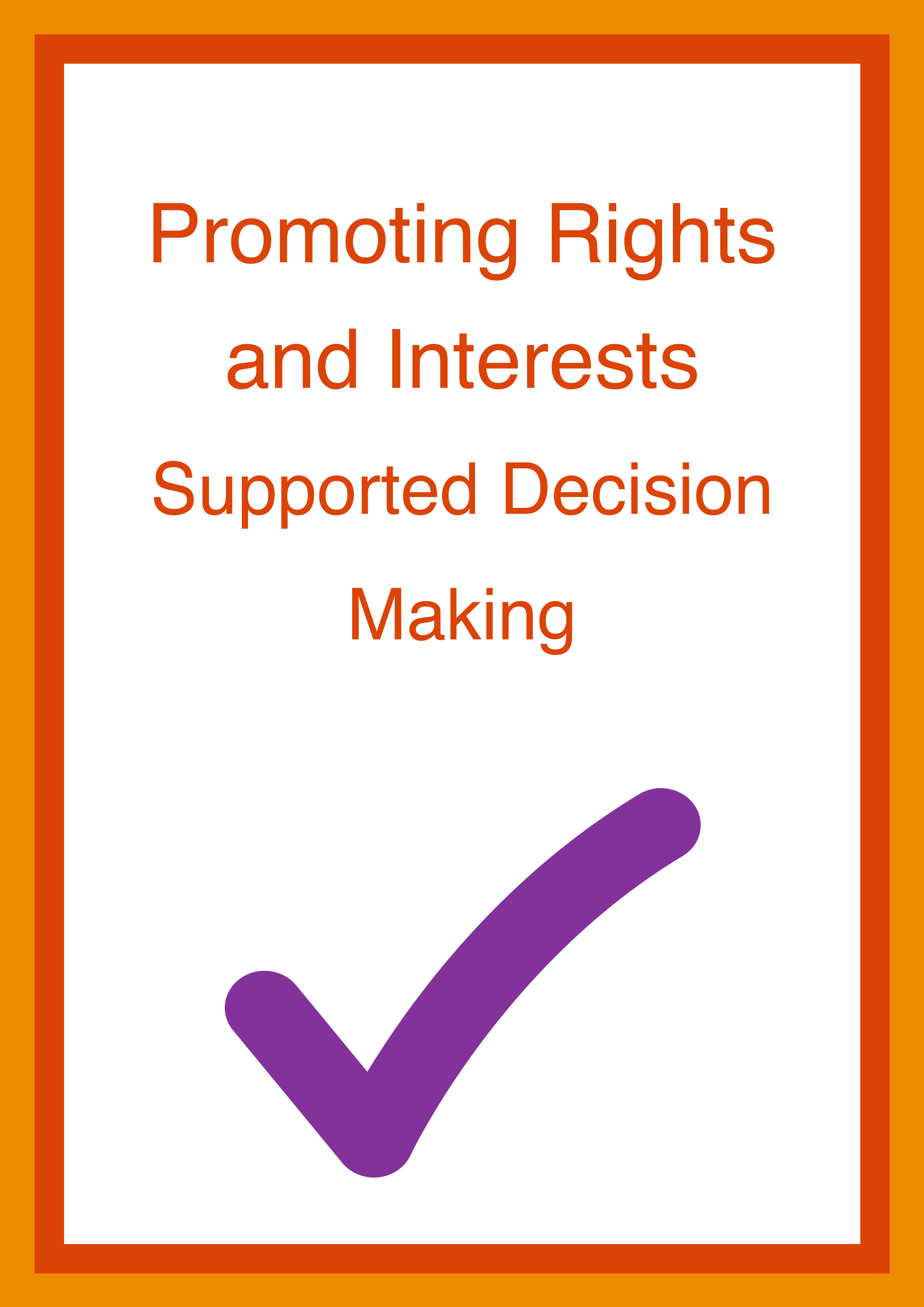
Promoting Rights and Interests: Supported Decision Making Annual Report
This report will reconsider the Stepped Model of Supported and Substitute Decision Making, the supported decision-making approach used in the South Australian Project, and the results of that project. This summary in this year’s Annual Report seeks to bring together this information.

A Process of Decision Making Support: Exploring Supported Decision Making Practice in Canada
The aim of this study was to explore how people were supported with their decision making in Canada. The findings have helped to broaden understanding of supporter neutrality and undue influence, and the complex, dynamic and multi-factorial nature of decision support.

Does Reflection Lead to Wise Choices?
Does conscious reflection lead to good decision-making? Whereas engaging in reflection is traditionally thought to be the best way to make wise choices, recent psychological evidence undermines the role of reflection in lay and expert judgement. The literature suggests that thinking about reasons does not improve the choices people make, and that experts do not engage in reflection, but base their judgements on intuition, often shaped by extensive previous experience. Can we square the traditional accounts of wisdom with the results of these empirical studies? Should we even attempt to?

The temporalities of supported decision-making by people with cognitive disability
This paper offers insights on the concepts of temporal scales and boundaries as aspects of the so-called ‘structural features’ of time and temporality (Adam, 2000; Schwanen & Kwan, 2012) and demonstrates the significance of these in the construction of identities, self-determination and the exercise of power in decision-making processes.

Aligning with the flow of control: A grounded theory study of choice and autonomy in decision making practices
Choice and autonomy are recognized as values facilitating genuine self-determination. Subsequently greater understanding of these concepts in decision-making practice is required. This research study undertaken in a single organization in the Republic of Ireland applied classic-grounded theory methods. Participants included twelve adults who were attending day services and accessing a variety of other organizational services. The main issue of concern for these participants was ‘control’ in environments that were controlling of them and they responded by ‘aligning with the flow of control’ explained by how they framed control, emotionally connected and adjusted in compliance situations.

Supported Decision Making: A roadmap for reform in Newfoundland and Labrador
IRIS – Institute for Research and Development on Inclusion and Society was engaged by the Newfoundland and Labrador Association for Community Living, on behalf of the ‘Steering Committee on Citizenship and Legal Capacity for All’ to: identify key issues and barriers to legal capacity; recommend directions for reform; and outline a ‘roadmap’ to implement them. The review involved focus groups and key informant interviews with community stakeholders and senior government officials, as well as extensive legal research.

Academic Research and Professional Evaluation of Circles of Support & Microboards – COSAM
This research and evaluation summary aimed to shed light on the organisational and operational elements of Circles of Support as well as its perceived outcomes. It explored key areas of staff, practice, and organisational strategies used to develop Circles of Support, and perceptions about outcomes experienced by people with intellectual disability, the families and circle members.

Realising ‘will, preferences and rights’: reconciling differences on best practice support for decision-making?
This article explores key debates across disciplines and draws on grounded theory fieldwork findings to bring greater clarity to the principle within law, policy and practice settings. It is argued that the principle calls for a nuanced understanding which cautions against expectations that mere enactment into law or adoption within programs of support will prove to be a panacea.

Supported Decision Making and Paradigm Shifts: Word Play or Real Change?
As is the case for many jurisdictions Scotland is wrestling with the issue of giving meaningful effect to the Convention on the Rights of Persons with Disabilities (CRPD), particularly its Article 12,and the extent to which this is possible. Indeed, whilst some of the conceptual and practical aspects of giving effect to Article 12 are unique to Scotland many other conceptual, and some practical, aspects are common to most states. A consideration of these issues are therefore of value to those seeking to bring about CRPD related change in Scotland and also in other jurisdictions.

Beyond Guardianship
The National Council on Disability (NCD) undertook this report to foster a greater understanding of guardianship within the context of disability law and policy; to examine the treatment of people with disabilities within the legal system that establishes guardianship; to examine the use of alternatives to guardianship such as supported decision-making; and to make recommendations that will help align the use of guardianship and decision-making alternatives with the Americans with Disabilities Act (ADA) with particular focus on the integration mandate. The report’s findings and recommendations are the product of qualitative research on the experiences with guardianship and decision making alternatives of people with disabilities, their families, and professionals within the guardianship system gleaned through interviews; in addition to an extensive review of relevant scholarship and recent studies.

Stop, Look and Listen to Me
Everyone has the right to have their voice heard. However, the Challenging Behaviour Foundation (CBF) hears far too often from families who say their child has been excluded from consultations about services which directly affect their lives, even where there is a legal obligation to listen to their views (for example, section 19 of the Children and Families Act 2014).This project was a small-scale piece of work, combining the expertise of the Tizard Centre and the Challenging Behaviour Foundation to seek the views and wishes of young people. This report contains the results of our “Stop, Look and Listen to Me” project, developed with the Tizard Centre at the University of Kent, to seek the views and experiences of children and young people up to the age of 25.

Increasingly Consulted, but not yet Participating
This report presents the findings of the first-ever global survey led by Organisations of Persons with Disabilities (OPDs) on their participation in decision-making. It is the first attempt of this scale to monitor how Article 4.3 and Article 32 of the Convention on the Rights of Persons with Disabilities (CRPD) is turned into action. The exclusion of persons with disabilities from decision-making processes perpetuates and exacerbates their exclusion from all areas of society. When their perspectives are systematically ignored, this leads to public policies and programmes that are not responsive, not effective and continue to hinder their rights.

Supported Decision Making: Experiences, Approaches and Preferences-Easy Read
This document is an Easy Read summary of the ‘Supported decision making – experiences, approaches and preferences’ research report. The research report is all about how people have made decisions, and what types of support they like.

Supported Decision Making : Experiences, Approaches and Preferences
This report presents the findings from a research project which explored how people have, or have not been, supported to make their own decisions. Making decisions about your own life is a key aspect of independence, freedom and human rights. Mental health law in Ireland has previously allowed compulsory intervention even when a person has the decision making ability to refuse intervention.

Support for Decision Making in the NDIS
The purpose of this paper is to develop an understanding of the concept of support for decision making in the NDIS. The paper will provide the basis of advice to the NDIA Board in relation to the development and implementation of a consistent approach for support for decision making that meets the Scheme obligations and aspirations to provide real choice for people with disability. Supported decision making starts from the premise that everyone has the right to participate in decision making and everyone draws on some support at some time to make some decisions.

Microboards: Social Capital and Quality of Life
A Microboard™ is a small group of dedicated friends and family who work together to help an individual plan their life, brainstorm ideas, advocate for what they need, monitor services, and connects the individual to their wider community.

Microboards™, Social Capital and Quality Of Life
While distinct concepts, social capital and quality of life have multiple intersections. Social connections and relationships are a critical variable in quality of life outcomes. This research project sought to examine through qualitative interviews with Microboard members how MBs may help to connect people to their communities and serve as a means to enhance and sustain social capital and quality of life.

Supporting Choice and Control: An analysis of the approach taken to legal capacity in Australia’s National Disability Insurance Scheme
This article will examine how the notion of choice and control has been operationalized within the NDIS framework and critically analyse this against the requirements of the United Nations Convention on the Rights of Persons with Disabilities (CRPD) adopted in 2006. It will demonstrate that whilst the NDIS seeks to promote individual autonomy and champion the provision of support, it still permits a substituted decision-making model for the exercise of legal capacity via the appointment of nominees.

Editorial: Human Rights and Mental Health: Current Developments in Competence Assessment and Supported Decision Making
This Research Topic presents the results of the international and interdisciplinary workshop Human Rights and Mental Health, held at the Institute for Medical Ethics and History of Medicine of the Ruhr University Bochum, Germany, on April 1–5, 2019. The workshop focused on ethical and legal issues surrounding the implementation of the United Nations (UN) Convention on the Rights of Persons with Disabilities (CRPD) in mental health care.

Piloting Personhood: Reflections from the first year of a supported decision making project
The Symposium on Personhood and Civic Engagement by People with Disabilities included a variety of perspectives: legal, cultural, historical, philosophical, and educational, including a panel on “Legal Barriers to Personhood” from which this article was derived. This Article attempts to describe some of the lessons learned in the first year of an ongoing experiment in implementing legal capacity through supported decision-making (SDM). Demonstrating the success of this pilot project, the first in New York and the most extensive in the United States, is critical to influencing advocacy and legislative reform to promote and protect personhood.

Development of an evidence-based practice framework to guide decision making support
This paper details a research program whereby an evidence-based Support for Decision Making Practice Framework has been developed for those who support people with cognitive disabilities to make their own decisions across life domains.

Companion Paper: Supporting you to make your own decisions
This document complements the ‘Consultation Paper: Supporting you to make your own decisions’ that was released for public consultation on 21st June 2021. This document was developed based on input from a range of stakeholders.

Consultation Summary: Supporting you to make your own decisions
The National Disability Insurance Agency is developing a Support for Decision Making policy. Consultation sessions were held through an online survey and written submissions during a 12-week consultation period held between 21 June and 10 September 2021. This report provides a summary of the feedback received from people with a disability, families, carers, disability representative organisations, service providers, government departments, academics and health professionals.

Inclusion Australia: Submission to the NDIS Support for Decision Making Consultation
The National Disability Insurance Agency (NDIA) released their ‘Supporting you to make your own decisions’ consultation paper in June 2021. Inclusion Australia’s response includes feedback on the Paper, recommendations for the NDIS Support for Decision Making policy and case studies to help the NDIA better understand the lived experiences of decision makers and their supporters.

Convention on the Rights of Persons with Disabilities Research Report – Easy Read
This Easy Read report is a summary of a report called Convention on the Rights of Persons with Disabilities: Shining a light on Social Transformation.
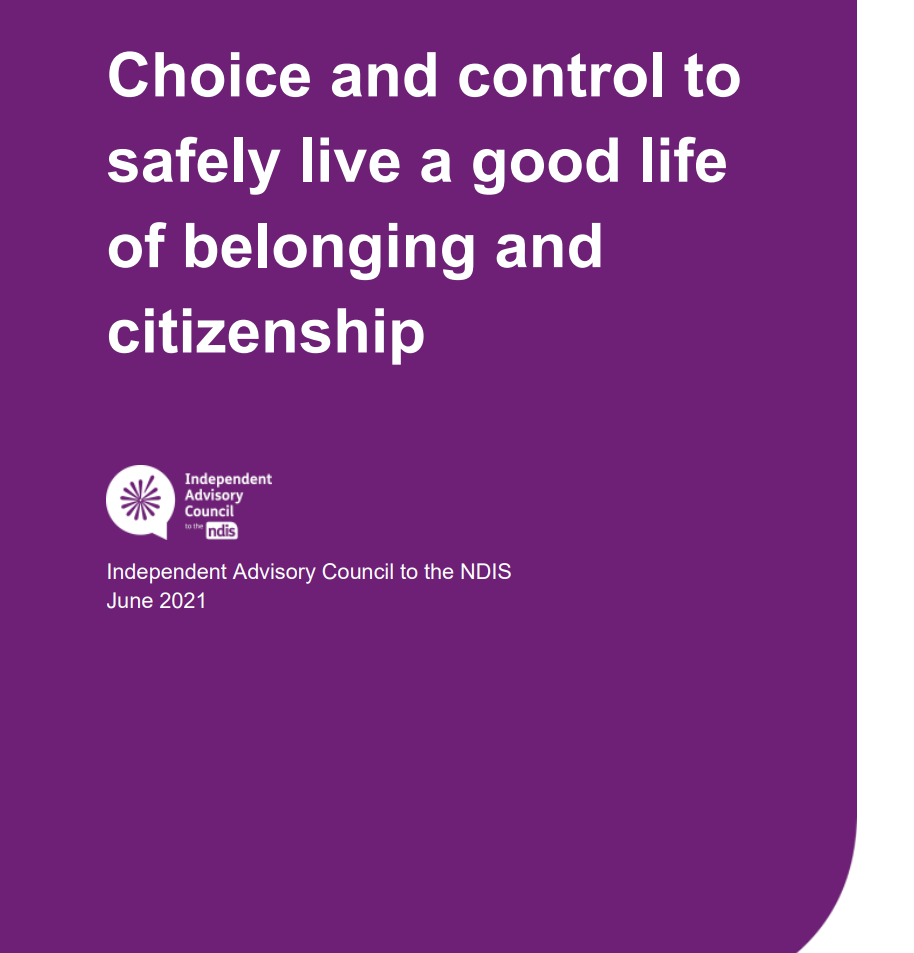
Choice and Control to Safely Live a Good Life of Belonging and Citizenship
This paper provides advice to the NDIA Board as to an approach to assist participants, their families and carers to develop strategies for their personal safety to enable them to live a full life safely. The rights based framework of the NDIS Quality and Safeguarding Framework defines safeguards as actions designed to protect the rights of people to be safe from the risk of harm, abuse and neglect while maximising the choice and control they have over their lives. This definition was further clarified by the WA Disability Services Commission describing safeguards as supports and mechanisms that promote, enhance and protect an individual’s human rights, decision making, choice and control, safety and wellbeing, citizenship and quality of life.

Circles of Support and Microboards: Research and Evaluation Summary
The National Resource Centre for Circles of Support and Microboards NRC COSAM engaged a number of Australian organisations experienced in developing and maintaining Circles of Support and/or Microboards as partners and contributors. The individual and collective experience of these organisations, the people they support, their families and Circle/Microboard members provided important information for the collation and development of resources, and in the provision of information for this research.

19 Stories of Social Inclusion
What experiences of social inclusion do people with intellectual disabilities have in Ireland? While this research aims to demonstrate positive stories of social inclusion, it is worth bearing in mind that those people with intellectual disabilities who are living fully or partly socially included lives, are often doing so in spite of continued social exclusion and the prevalence of multiple barriers to inclusion in society. Recommendations include Full implementation and adequate resourcing of decision-making structures and supports such as the Decision Support Service and Plan for the Effective Participation in Decision Making as well as ratification of the Optional Protocol to the UNCRPD will support people with intellectual disabilities to exercise choice and control. Participants expressed that social inclusion gave them a sense of belonging and contributing and placed great value on having choice and control in their lives.

Supported Decision Making Pilot Program: 2 Year Evaluation Report
In the United States, adults with intellectual and/or developmental disabilities are particularly at risk for losing their legal right to make decisions about their lives, including where to live, what to do during the day, and what kinds of health care they will receive. Decision making rights for adults with disabilities are often removed and awarded to a substituted decision maker as occurs under guardianship. HSRI’s evaluations shared the story of a collaborative, intentional SDM pilot and distilled the experiences of participants, lessons learned and implementation challenges.

Interplay Wellbeing Framework
These analyses confirm statistically the holistic nature of wellbeing for Aboriginal people in remote Australia, and the importance of culture, empowerment and community to government priority areas of education, work, health and wellbeing. The evidence reported here demonstrates that all of these factors interplay through both direct and indirect relationships. They all interrelate -they all influence one another and exist as one entity. This research aims to statistically validate the holistic Interplay Wellbeing Framework and Survey that bring together Aboriginal-identified priorities of culture, empowerment and community with government priorities including education, employment and health.

Evaluation of the CREATE Ability Project, Year 2 (TAP2)
The CREATE Ability Project (TAP2) aimed to empower young people with disability in or leaving the care of the Minister to transition to independence and promote supported decision-making through participation in workshops and camps, underpinned by education grounded in human rights principles. This evaluation identified the effectiveness of TAP2 in building young people’s capacity to understand and implement supported decision-making. It assessed whether over time their understanding of supported decision-making principles improved, and considered which aspects of the project contributed to promoting these principles of decision-making.

Towards Inclusive Cities and Social Sustainability
A scoping review of initiatives to support the inclusion of people with intellectual disability in civic and social activities. The aim of this scoping study was to map key concepts underpinning interventions to include people with intellectual disability in their local community, and the main sources and types of evidence available.

Belonging and exclusion in the lives of young people with intellectual disability in small town communities
The aim of this research was to investigate the lived experiences of belonging and felt exclusion for young people with intellectual disability living in regional (small town) communities. This article focuses on the findings from the project about how the young people’s experiences of connections to place, space and people influenced their felt sense of belonging and exclusion, and from this, implications for developing social policy which is more responsive to their priorities and lived experience.

Changing community attitudes to improve inclusion of people with disability
The Royal Commission into Violence, Abuse, Neglect and Exploitation of People with Disability (Royal Commission) wants to know what could be done to change attitudes towards people with disability so that they are better included in society. The research found evidence about interventions to change attitudes, behaviours and outcomes. The three concepts are linked and are measures that indicate the social inclusion of people with disability. Social inclusion is an indicator of equality from the human rights of people with disability.

Using the ‘in-between’ to build quality in support relationships with people with cognitive disability
This article presents research about relationships between young people with cognitive disability and their support workers. Specifically, it, uncovers the spaces and times (space-times) within, and mobilities between, disability programme sites, which are commonly understood as inevitable but not necessarily productive or useful.

Impact of organisational practices on the relationships between young people with disabilities and paid social support workers
The context in which paid support relationships are experienced is rapidly changing in Australia with the introduction of the National Disability Insurance Scheme (NDIS), the marketisation of support services and a policy emphasis on self directed, person-centred care (David & West, 2017). These changes reflect international shifts towards individualised funding and direct payment schemes. They are consistent with the emphasis of the United Nations Convention on the Rights of Persons with Disabilities (CRPD, 2006) on the rights of people with disabilities to make decisions about what services they receive and how they are delivered.

Literature and practice review: Support to make decisions that promote personal safety and prevent harm
The NSW Council of Social Service (NCOSS) is undertaking an action research project to develop (1) a practice model of delivering supported decision-making with a safeguarding focus for people with disability and (2) organisational capacity to provide best practice individual safeguarding support to a diverse range of people with disability. The Social Policy Research Centre (SPRC) has been commissioned to provide research advice, training and action research practice support to NCOSS.

Skilled to Thrive Project Plan: Support to make decisions that promote personal safety and prevent harm
This project research plan was undertaken in 2017. Changes in disability policy, such as the introduction of the National Disability Insurance Scheme (NDIS), entail a move away from substitute decision making for the person with disability to supported decision making by the person themselves, with appropriate safeguard supports to reduce the risk of harm. The project objective is for NSW Council of Social Service (NCOSS) to develop a practice guide to inform organisational capacity to support workers who support people with disability to make decisions about personal safety ,wellbeing and preventing harm.
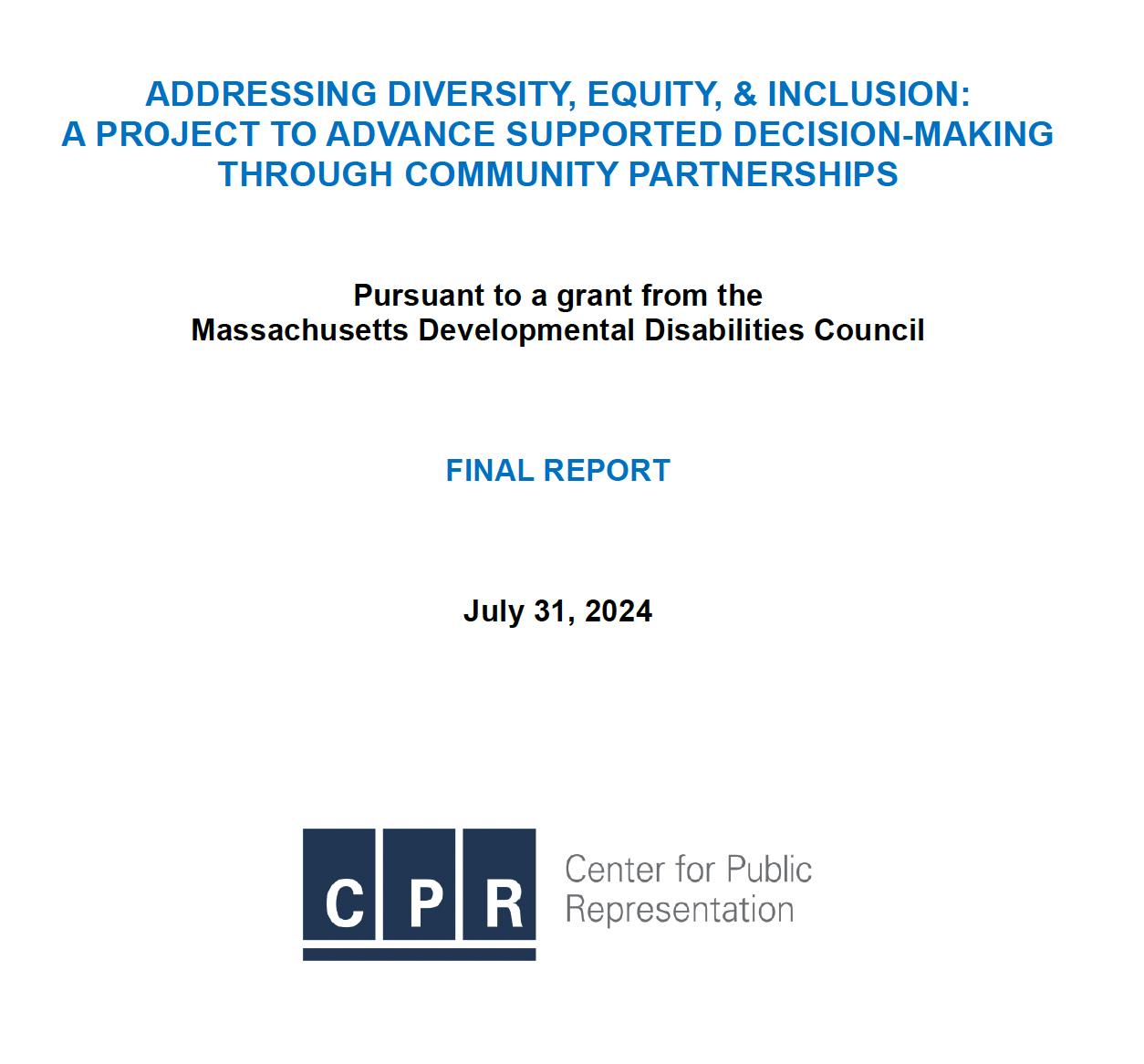
SDM through Community Partnerships
As part of the Racial Equity and Supported Decision-Making Initiatives, Center for Public Representation worked alongside community partners to pilot trainings on SDM and other alternatives to guardianship for family members and people with intellectual and developmental disabilities within underrepresented and underserved populations in Massachusetts.

Legal Capacity
This report presents the European Union Agency for Fundamental Rights’ (FRA) legal analysis of standards and safeguards concerning the legal capacity of persons with intellectual disabilities and persons with mental health problems. Thus far, the CRPD Committee’s concluding observations forcefully underline the convention’s guarantees, which would support calls to abolish or overhaul national legislation that allows for substituted decision-making models and replace them with supported decision-making measures that respect the person’s autonomy, will and preferences.

Moving from Support for Decision-making to Substitute Decision-making: Legal Frameworks and Perspectives of Supporters of Adults with Intellectual Disabilities
This paper describes the legal substitute and supported decision-making frameworks (excluding mental health legislation) that operate in Australian jurisdictions and goes on to offer some insights into the lived experience of those providing informal support to adults with an intellectual disability.

Supporting Inclusion of people with Cognitive Disabilities
The study aimed to shed light on the organisational and operational elements of the concept of circles of support as well as its perceived outcomes. It explored key areas of staff, practice and organisational strategies used to develop circles of support, and perceptions about outcomes experienced by people with intellectual disability, the families and circle members.

Research Report: A framework for supported decision-making: Easy Read version
This Easy Read report is a summary of a report called Diversity, dignity, equity and best practice: a framework for supported decision-making.
A summary only includes the most important ideas.

Research Report: Diversity, dignity, equity and best practice: a framework for supported decision-making
This research aimed to understand the significance of supported decision-making to the lives of people with cognitive disabilities, identify its essential elements common to anyone with cognitive disabilities in any context, and locate key implementation issues. For this Report, we understand people with cognitive disabilities to include people with intellectual disabilities, acquired brain injury, dementia and mental health conditions. Synthesising the research findings, this Report articulates the benefits of supported decision-making, sets out nine principles and eight essential elements of a ‘Diversity, Dignity, Equity and Best Practice Framework for Supported Decision-making’ and recommends implementation strategies.

Roundtable Supported decision-making and guardianship: Proposals for reform
The Royal Commission into the Violence, Abuse, Neglect and Exploitation of People with Disability (the Royal Commission) is looking at the right to autonomy for people with disability, including how this applies in guardianship and decision-making arrangements.

Getting Under The Skin Of It Phase II Summary Report
Phase II of the “Getting Under the Skin Of It” project moved onto a discovery phase – to develop, through learning groups, practical lessons on how we can develop the conditions in which innovations can flourish or proliferate.

Getting Under The Skin Of It
The Social Care Innovation Network is a partnership between SCIE, TLAP and Shared Lives Plus, funded by the Department of Health and Social Care. Its purpose is to examine and promote ways that innovative approaches to social care and support can be supported to flourish and develop. The report will be of interest to all those who are interested and committed to creating a new and better form of social care – based on the principle that people want a life and not a service.

Ten Actions for an Asset Based Area
TLAP’s first paper on the asset-based area laid out a clear case for adopting an asset based approach to care and support. This expanded version is action oriented, with examples of where councils and other organisations are taking practical steps to shift in the direction of an asset-based area. The resource will interest people working in councils, those who run organisations that provide support, and people who draw on care and support, including organisations that represent their views and interests. It is intended as a practical glimpse of what is being made possible in some areas and organisations, rather than a detailed blue-print.

The Asset Based Area
A briefing paper by Shared Lives Plus CE Alex Fox which describes ten features of an ‘asset-based area’ necessary for developing strong communities and sustainable public services. It will be of interest to council, clinical commissioning group commissioners and wider public professionals. An asset-based public body does not have ‘customers’ (whose only responsibility is to pay taxes), rather it views everyone, including people with long term support needs, as citizens, with rights and responsibilities.
